
I SPENT A LITTLE OVER A YEAR IN JERSEY, THE LARGEST OF THE Channel Islands. This would be followed by two and a half years in London. I would be caught between East and West, and would have to make up my mind about where I belonged. The link with Britain was tenuous, after all; based on heredity rather than upbringing.
I had come to England with a dream of sorts, and I was to return to India with another kind of dream; but in between there were to be four years of dreary office work, dank and cheerless bed-sitting rooms, shabby lodging houses, cheap snack bars, hospital wards, and the struggle to write my first book and find a publisher for it. I discovered that the world could be a lonely place for someone like me. And I found that becoming a writer wasn’t just a matter of putting pen to paper—although that was certainly the first step!

Jersey was a beautiful island—wide bays, pretty inlets, a busy little port, a quaint capital (St Helier), and farms famous for tomatoes and Jersey cows. But I knew no one outside my aunt’s family, and my relatives showed no great interest in my literary ambitions.
Within a week of my arrival I was down with jaundice again. I must have picked it up in that seedy little hotel in Bombay, and the virus had been lurking in my system throughout that long sea voyage. Certainly no one in Jersey suffered from jaundice or any tropical disease. But with the right diet and rest I recovered quickly, and immediately set about looking for a job. I did not want to be a burden on my aunt any longer than was absolutely necessary.
I did not waste time with job applications or employment agencies. I simply set out down the high street of St Helier, knocked on doors, waited outside offices, walked up to anyone who appeared to be in charge and enquired politely: ‘Excuse me, sir, I’m looking for a job. Do you have a vacancy?’ Usually there was no vacancy, but people were surprised at my direct approach and occasionally someone would ask me what I could do. ‘I can type,’ I’d say. ‘I know a little shorthand. I can attend to correspondence. I can make out a bill.’ And then in desperation: ‘I can make tea.’
The office manager of a large grocery chain, Les Riches, looked me up and down and asked me if could do any accounting. ‘Not very good in maths,’ I said honestly ‘But I can add and subtract!’ He gave me a job as a junior clerk on three pounds a week, which wasn’t bad for those times. I gave one pound a week to my aunt, and spent the rest on books, films and stationery. And I bought myself a new pair of shoes, because my aunt would say, ‘A man is always judged by his shoes, Ruskin, your shoes look very shabby.’
I had never paid much attention to my appearance, and my trousers were usually unpressed, my shirt sleeves frayed, my ties ragged (you had to wear a tie to work in those days), but I made an effort to smarten myself up, both to please my aunt and to impress the girls who worked at Les Riches. I worked with some twenty other clerks, a mixed bunch, in a large, gloomy office above the store. It was winter—dark when I walked to work at eight in the morning, dark when I walked back from work at six in the evening. Saturday afternoons we were free, and of course Sunday was a holiday. My fellow clerks, most of them senior to me, were a friendly lot, who talked about football, films, the weather and the Royal Family. When King George VI died, we observed a minute’s silence. He’d been a popular king, very brave and unselfish during the war, in spite of poor health. I remember my father used to think highly of him.
I would always miss my father, but now I was missing India and my friends in Dehra. During that last year, I had made many attachments—Somi and his brothers; Krishan and his mother; Ranbir and his sister Raj; and I missed our games and picnics and little expeditions into the foothills. And the bazaar with its sweet shops and chaat shops, and the little railway station, and the lonely mango groves, and the bulbuls and mynahs and other small birds who would visit my room on the roof. Here in Jersey, there were only seagulls! And it was an insular place. There was little here to remind me of India or the East, not one brown face to be seen in the streets or on the beaches. I’m sure it became a different sort of place in a decade or two, but in the 1950s it had nothing to offer by way of companionship or good cheer to a rather sensitive boy who had left home and friends in search of a ‘better future’.
Occasionally, after an early supper, I would walk along the deserted seafront. If the tide was in and the wind approaching gale-force, the waves would climb the sea wall and drench me with their cold salt spray. My aunt thought I was quite mad to take this solitary walk; but the fierce wind and the crashing waves gave me a sense of freedom, and some solace. Not since the year following my father’s death had I been such a loner.
The attic room I’d been given had no view, so one of my favourite occupations, gazing out of windows, came to a stop. But perhaps this was helpful, in that it made me concentrate on the sheet of paper in my typewriter. At night, I would take out my Dehra journal and put some of the entries into story form. Perhaps they would make a book of sorts. And I was writing stories and sending them to English magazines, but they came back with polite rejection slips.
I discovered the St Helier library, and lapped up the collected plays and poems of Rabindranath Tagore; a couple of novels by Mulk Raj Anand and R.K. Narayan; a charming childhood memoir by Sudhin Ghose set in the Santhal Parganas (And Gazelles Leaping ); and the novels of Rumer Godden. These books—particularly Tagore’s poems—kept me in touch with the soul of India.
One of Rumer Godden’s novels, The River , had recently been filmed by Jean Renoir, the great French director, and it ran for a week in one of St Helier’s cinemas. I saw it several times—enchanted by its lyrical intensity, its glorious colour, and the way in which it captured the atmosphere of a corner of India that resonated in my heart. I read all Rumer Godden’s ‘Indian’ novels—Black Narcissus (also a beautiful film), The River , and Breakfast With the Nikolides (possibly her best)—and resolved to capture, or recapture, my own corner of India in the novel that was slowly taking shape.
By now I had left Les Riches, and taken a job as an assistant in the newly-opened office of Thomas Cook, the travel agency. Thomas Cook had sent a representative, Mrs Manning, over to Jersey to look after their expanding travel business (hotel bookings mostly) on the island. Mrs Manning needed an assistant who was polite and who could speak good English, and I seemed to fit the bill.
One of my faults is that I am over-polite, too willing to please, and as a result I am bullied and over-ridden by strong, masterful types—particularly women. Mrs Manning was the strong, masterful type, who soon had me doing everything in the office, from making tea to answering the phone to making hotel bookings to starting a filing system to typing the office correspondence and then to going out to post it while she chain-smoked and spoke non-stop but distractedly on the phone. Sometimes she was absent for hours, for she was having a passionate affair with a smooth-talking, good-looking man who made a living from selling used fire extinguishers. He was a conman, really, and a smart one. He bought up old fire extinguishers, put them in working order, gave them a fresh coat of paint, and then drove around the island selling them as new. My boss, Mrs Manning (I never did learn who Mr Manning might have been) accompanied him on his drives around the island, which must have been fun—Jersey’s climate and scenery was just right for middle-aged lovers.
Left in charge of the affairs of a famous travel agency, I did my best to cope with an ever-increasing volume of work; but inevitably there was some confusion and several mix-ups. An elderly couple had wanted a room with twin beds—why had I given them a double-bed? And there were the honeymooners who wanted a double-bed and who’d been given separate beds. Some hotels still had a colour bar—the rest of Britain had, largely, begun to acknowledge and address its centuries-old racism, but not Jersey—and I was given a dressing-down for booking a group of Samba dancers from Brazil into a hotel meant for all-white customers.
Coming under fire, Mrs Manning fired me. A few weeks later she was recalled to London; maybe she took her fire-extinguisher lover with her. I never found out because by that time I had another job, this time in Jersey’s Public Health Department.
The idea of being dependent on others never appealed to me, and I was never without a job for long.
In the offices of the Public Health Department, close to the St Helier docks, I was in the company of several senior clerks, engineers and secretaries, and got on famously with everyone. Of the year I was with them, I have only fond memories.
I was the youngest, and everyone called me Russ—or, when they learned of my writerly ambitions, Pushkin! I remember their names—Mr Bromley, the gentlest of them all; a human chimney called Bliault (a French name—the Channel islands being originally French; most people spoke a French patois); Mr Cummings, who had been in the navy during the war; and our chief, Mr Gothard, a very nice, soft-spoken man. There was also an engineer, McLintock, a Roman Catholic, and as Catholics don’t believe in birth control, he had twelve children. I don’t know how he was managing on his salary, bringing up so many children. He was a nice man too, except that he would keep telling me I should ‘look up the Catholic faith.’ He was trying to convert me. Although a Protestant, I wasn’t into religion at all, and I let him carry on, showing no interest whatsoever, till he got the message and stopped.
I ended up spending a lot of time with Mr Bromley, a quiet, gentle man in his early fifties. A widower, he lived alone in lodgings close to my aunt’s house, and we would walk back together every other evening. He was a Yorkshireman who had settled in Jersey for health reasons. Yorkshire, he said, was too damp, which wasn’t good for him, and he’d been told by the doctors to go to a sunnier place. He did not tell me the nature of his illness; but he often spoke about his son, who had been killed in the war, and about the North Country, which was his home. He sensed that we were, in a way, both exiles, our real homes far from this small, rather impersonal island.
Mr Bromley had read widely, and he rather admired my naïve but determined attempt to write a book. I think it was he who had given me the name Pushkin, and would ask every now and then how my book was coming along.
One evening I stopped in front of a shop which had a little portable typewriter on display that I’d been admiring for some days, and I said, ‘How I wish I could buy that.’ My old typewriter was in bad shape, a couple of the keys had jammed and I had to ink the letters by hand after I had finished typing.
‘Is it very expensive?’ Mr Bromley asked.
‘It’s nineteen pounds. I only have six pounds saved up, so maybe in a few months.’ And I began to walk.
Mr Bromley stopped and said, ‘I tell you what, lad. Give me your six pounds, and I’ll add thirteen pounds to it, and we’ll buy the machine. Then you can pay me back out of your wages—a pound or two every month. How would that suit you?’
Something about Mr Bromley’s demeanour, and the rapport we had developed, made me accept his offer without hesitation. We bought the typewriter and I walked home feeling a little more confident about my writerly efforts. It took me several months to repay the loan—I kept sending some money every month even after I moved to London—but Mr Bromley was always patient.

While in the Public Health Department, I was persuaded by my senior colleagues to sit for the Jersey Civil Service exam, which was open to everyone regardless of qualifications. There were papers in General Knowledge, Elementary Maths, History and English Literature, as well as an Intelligence Test. As the reader knows, I had an aversion to exams, but Mr Bromley and the others prevailed upon me to take the exam, which I did, along with some 200 other candidates.
To my surprise (and to the astonishment of my aunt and uncle) I stood fourth in the island, with special mention of my excellent English Literature paper.
This meant that I was now eligible for a permanent post in the Public Health Department, or in any other department of the local government. There was an interview for those who had cleared the exam, and one of the men who was interviewing me said they would give me a promotion if I moved to the medical service department, where they needed people. I said I was happy in the Public Health Department; I was used to the work and the people, so I’d rather stay there. The interviewer looked a little surprised, then said, ‘Well, there’s something to be said for loyalty.’
I suppose it was loyalty of a kind. Mr Bromley and the others had been good to me, and if it was going to be Jersey and a routine job, I’d rather be among people with whom I was comfortable.
But the real reason was different. Yes, I could have settled down in Jersey and grown old there, on a comfortable salary and the prospect of a pension. Everyone would have approved—my aunt and uncle; my mother back in India; my well-meaning colleagues. But I wasn’t looking for permanency or the unexciting life of a government servant. I didn’t refuse the permanent job, but in my heart I knew I wasn’t going to stay.
Encouraging noises were coming from a publisher in London, who had read the first draft of my novel. Her name was Diana Athill, a partner and editor in the firm of Andre Deutsch Ltd., an up-and-coming publisher. She was enthusiastic about the book, but she felt it needed some re-working, and she had suggestions to make. And I have always been open to suggestions.
London beckoned. That was where writers and publishers flocked together. That was where Dickens had lived, and Thackeray, and Galsworthy, and dear old Hugh Walpole, a brave man, and a friend to young writers. That was where Barrie was commemorated with a statue of Peter Pan in Kensington Gardens. That was where Bertie Wooster and Jeeves and the members of the Drones Club indulged in the festive spirit. Or so I imagined…
But the real impetus or catalyst to my leaving Jersey was a falling-out with my relatives, specifically my uncle.
A Christian from Pondicherry, Dr Heppolette was upright, honest and hardworking (and he’d been a well-known doctor in Lahore), but he was set in his thinking and his prejudice against the country of his birth. He did not think much of India or of Indians, and frequently expressed the gloomiest of forebodings on the future of the country, just five years into Independence. He was also very vocal about his disapproval of my mother and the life choices she had made, ending up with an ‘Indian’. Both he and my aunt had led a privileged existence in British India, and had left because of the loss of privilege. There were many like them. I felt that his attitude was unfair, and said so; but because I was living with them as a ‘poor relation’, even though I was paying my way, I did my best to avoid heated arguments or any unpleasantness. Instead, I put down my thoughts and feelings in the diary I was keeping. Unfortunately—or fortunately, I suppose, now that I look back—it fell into the hands of my uncle, who couldn’t resist reading it, and we had an almighty row. Among other things, I was accused of ingratitude, and that by itself convinced me that I ought to move on.
Whenever I was unhappy or disturbed, I used to go for a walk along a lonely stretch of seafront, and that was what I did now, although it was late evening. There was a storm brewing and the waves were crashing in and there was nobody else on the seafront. The tide was high, and a wave smashed itself against the sea wall, sending the salt spray on to my head and face. I almost lost my balance, but I stood my ground, and then I stood defiant, taking another stinging spray on my body, and then another, as the wind howled around me, testing and daring me. It was an exhilarating sensation, guaranteed to make me feel brave and indomitable—I would survive. With the help of the natural elements around me, I resolved, there and then, that I would leave Jersey the next day.
And this is exactly what I did.
Suitcase in one hand and portable typewriter in the other, I made my way down to the docks and bought a ticket on the first small steamer leaving for Plymouth. I hadn’t even bothered to give notice to my employers, and as a result I lost the previous week’s salary. But I had about twenty pounds saved up, and in 1952 that would have kept me from starvation for about a month.
It was March, and the Channel was foggy, and the sea choppy. But I felt quite confident in myself and in the future. I suddenly realized that for the first time in my life I was really and truly on my own. No parents to back me, no relatives to fall back on. Alone. All by myself in a wilderness of wind and water. The way I wanted it. Eighteen, and in control of my own destiny. For that man is strongest who stands alone.

I DIDN’T SEE MUCH OF LONDON FOR THE FIRST COUPLE OF DAYS, the fog was so thick and all-pervading. I spent two or three nights in a student’s hostel; it was cheap, but very noisy. I had the address of an old BCS boy, Shyam Kishan, who was in London for ‘higher studies’. He had a room in Belsize Park, and he insisted that I stay with him. He had been my senior in school, not a very close friend, but now he treated me like a brother. But I knew I had to fend for myself, and at the first opportunity I made my way to the nearest employment exchange and asked for a job.
I must have looked rather shabby. My trousers, as usual, were unpressed, my coat—the only one I possessed—a bit worn at the cuffs, my shoes unpolished. I had no overcoat, and I was feeling cold.
‘And what can you do?’ asked the clerk, looking at me doubtfully.
It was no use telling him that I’d written a book. They weren’t looking for an unemployed author.
‘I can type,’ I said. ‘I can write letters. I can make out bills. I can do accounts.’
‘Quite an all-rounder,’ he remarked, laughing. ‘Anything else?’
‘I can play football.’
‘Can’t help you there. You’ll have to join a football club. But there’s this factory in Swindon that makes football boots. Would you like to work in a boot factory?’
‘No, sir.’
‘All right, so here’s a desk job for you,’ he said, taking a card out of his index cabinet. ‘Photax, Photographic Accessories. They need an accounts clerk who knows some book-keeping. Starting on five pounds a week. That suit you?’
Five pounds a week sounded like a fortune. In Jersey I’d been getting three pounds.
‘Sounds all right.’
‘Here you are, then.’ And he gave me the address of Photax Ltd, who were to employ me in their office off Tottenham Court Road for the next two years.

Shyam, whom we knew in school as ‘Jackson’, which was the name of the high-end garments shop his father owned in Jodhpur, insisted that I could stay with him as long as I liked. But I didn’t want to impose on his goodness and hospitality. I went out and found a room for myself.
I moved around a fair amount during my stay in London, and that restlessness must say something about my state of mind at the time. First, there was a small attic room on Glenmore Road in north London, not far from the Belsize Road tube station and within a short distance of the Everyman Theatre, a small cinema which showed revivals of old films, and where I often spent a lonely evening. But the Glenmore Road room was cold and miserable, and it had a view of the overcast sky and the roofs of other houses—an endless vista of grey tiles and blackened chimneys, without so much as a proverbial cat to relieve the monotony. So I moved to a more pleasant abode on Haverstock Hill, where I lived for some months; then, for short spells, to lodgings on Belsize Avenue, Tooting, in south London, and Swiss Cottage in north London again.
Most of my landladies were Jewish. The first, whom I remember best, lived on the ground floor, two floors below my attic room. The only telephone in the building was outside her room, and occasionally when there was a phone for me, she would shout to call me down. But she could never pronounce my name right! ‘Rooskin!’ she would shout. ‘Roo-oo-skin. Call for you.’ And I would climb down the stairs, in no great hurry, because in those early months there were hardly any people I would have wanted to spend time with. I usually came back to my damp and sparsely furnished room to make myself a cheese sandwich—occasionally with ham—and then sit at my typewriter to work on my Dehra journal. Alone, till one day I noticed a roommate—a little mouse peeping out at me from behind the books I had piled up on the floor (I had no bookshelf). I threw him some crumbs and a bit of cheese from my half-eaten sandwich, and soon he was making a meal of them. After that, he would present himself before me every evening, and I was happier for the company.
My worldly possessions had increased, not only by the typewriter bought in Jersey, but also by a record player which I had bought second-hand from a Thai student, a friend of Shyam’s. I had become an ardent fan of the Black singer Eartha Kitt, and had bought many of her records; but they were no good without a player until the Thai boy came to my rescue. Then the sensual, throaty voice of Eartha—singing ‘Uska Dara’ and ‘I Want To Be Evil’—reverberated through the lodging house, bringing complaints from the landlady and the gentleman on the first floor. I had to keep the volume low, which wasn’t much fun. I was also fond of the clarinet (turi) playing of an Indian musician, Master Ebrahim, who did versions of popular Hindi film songs which transported me back to the streets and bazaars of small-town India.
On weekends I would explore the city, usually on foot, that being the best way to get to know a place. My conception of what London would be like was based on my early reading of Dickens and P.G. Wodehouse. Well, the London of Dickens was long gone, and the London (and England) of Wodehouse had never existed. There was more of the real world in Alice in Wonderland than in the world of Jeeves and Bertie Wooster. I would have gained a better idea of the city from the stories of Arthur Morrison (Tales of Mean Streets ) and Patrick Hamilton (Hangover Square ); but I came to these writers much later.
London was still recovering from the war, and in the East End and dockland there were still bombed-out buildings and empty sites where there had once been offices or residences. Sugar was still rationed, and I soon got used to the strong, sugarless office tea. Meals in the cheaper restaurants were on the skimpy side, and when I had finished my ‘meat and two veg’ in the nearest ABC café, I was still very hungry!
Still I tramped around the city whenever I could—searching the Thames dockland and the Mile End Road for traces of Bleak House or Our Mutual Friend . Dutifully I wandered through Kensington Gardens and paid homage to the statue of Peter Pan, took up my position on a corner of Baker Street and looked across at the entrance of the house where Sherlock Holmes and Dr Watson had met so many mysterious clients…
In the evenings, I usually took the tube train home after work from Tottenham Court Station to Belsize Park. Sometimes I walked. One evening I started walking through the maze of streets and I saw a little roadside restaurant and decided to have dinner there, having tired of cheese and ham sandwiches. I’d never been there before. I walked in, sat down, had a nice, good meal, and when it was time to pay the bill I found I didn’t have my wallet on me! It was getting towards winter and I’d kept it in my overcoat, which I’d left hanging in the office. I fiddled with the cutlery for a while, then decided to come clean. I went up to the manager and said, ‘I’ve had my dinner, sir, and it was very nice. But I don’t have any money with me. I’m sorry, I’ve left my coat in the office with my wallet in it.’ I told him where I worked, not far from the restaurant, on Goodge Street, but the office would be closed now. He looked me up and down, assessing me to see if I was telling the truth or pulling a fast one, and then he said, ‘All right. You can come by tomorrow and pay the bill.’ Which was what I did, first thing the next morning.
I would go to the restaurant once in a while after that in the evenings. During the day, a fellow clerk at Photax, Ken Murrel, would share his marmite sandwiches with me, made by his mother, or we would go out together to a snack bar during the lunch break. Ken was always very helpful; working class himself, he could tell that I was having a harder time. We exchanged a few letters soon after I returned to India, and then there was a period of some forty years when we didn’t correspond. About ten years ago, I received a letter from a man, who wrote to say he had my address from his father—Ken Murrel. Ken had been suffering from Alzheimer’s and barely recognized anyone. One day his son told him he was going on company work to a town in India called Dehradun, and Ken’s eyes lit up and he said, ‘That’s where Ruskin went, you know. He’s my friend.’ It was very touching to read that. Ken’s son came up to meet me from Dehradun, and I shared my memories of working with his father when we were both young, just nineteen or twenty.
But I did not make many English friends. If they were a reserved race, I was even more reserved. Always shy, I waited for others to take the initiative. In India, people will take the initiative, they lose no time in getting to know you. Not so in England. They were too polite to look at you. And in that respect, I was more English than the English.
The gentleman who lived on the floor below me on Glenmore Road occasionally went so far as to greet me with the observation, ‘Beastly weather, isn’t it?’
And I would respond by saying, ‘Oh, perfectly beastly,’ and pass on.
It was all very polite and insular, and rather dull. Things changed when I bumped into a Gujarati boy, Praveen, who came to live on the basement floor. He gave me a winning smile, and I remember saying, ‘Oh, to be in Bombay now that winter’s here,’ and immediately we were friends.
He was eighteen, and studying at one of the polytechnics with a view to getting into the London School of Economics. At that time, most of the Indians in London were students, the great immigration rush was still a long way off, and racial antagonisms were directed more at the recently arrived West Indians than at Asians.
Praveen took me on the rounds of the coffee bars, and introduced me to other students, among them a Vietnamese, called Thanh. He would become the subject of one of my stories, as would a distant cousin of his, a girl named Vu, and both relationships would end in some disillusionment, but more of that later.
Praveen liked gangster films and wanted me to accompany him to anything which featured Humphrey Bogart, James Cagney, George Raft and other tough guys. He wanted to be a tough guy himself, and often struck a Bogart-like pose, cigarette dangling from the side of his mouth. There was nothing tough about Praveen, who was really rather delicate, but his affectations were charming and comic and it was fun being with him.

From the room in Haverstock Hill, my second abode in London, it was a short walk to Hampstead Heath, the large park in London with its ancient woodlands and chain of ponds, and on one occasion I walked from Primrose Hill down to Regents’ Park. There was no shortage of greenery and parkland in London, and I wrote a story called The Green City which was never published, in fact lost by a future publisher.
Not much was being published, not even by the ‘little’ magazines to whom I submitted the odd poem. This prompted me to write the following verse:
Who’ll buy my poems?
I sang out to the silent stones.
And came the dread reply
In deep sepulchral tones:
We’ll buy your eyes
We’ll buy your heart and bones
We’ll buy your rags
And settle all your loans
But please don’t send us any poems,
We will not buy your rotten poems!
Needless to say, no one published it. Even Punch did not find it funny.
However, I had better luck with radio.
Dear old BBC. I was finally repaid for all my years of loyalty in listening to ITMA , Much-Binding-in-the Marsh , and Waterlogged Spa , not to mention the endless cricket commentaries, by having a story accepted and broadcast on the Third Programme, which was aimed at highbrows and super-intellectuals, which I definitely was not, but the producer, a nice lady named Prudence Smith, assured me I could pass for one. The story was called ‘The Rainbow,’ and I was invited to read it live, a daunting prospect; but I did it with aplomb after some rehearsals with the producer!
I no longer have the script; but it was to become one of the early chapters of The Room on the Roof —the episode in which Rusty plays Holi with the local boys and begins his discovery of India.
My employers at Photax were impressed (there was no one else to impress) and gave me leave to give two more talks, these on the more popular Light Programme—one of them about growing up in India (called ‘My Two Countries’), and another about life in the bazaars of an Indian city. The producer of this programme was a kind man called P.H. Newby, a well-known novelist and travel writer. Over the years, and even after my return to India, the BBC was to provide a home for many of my short stories.
A small digression at this point, to describe a brief encounter that shows how different the life of a writer was fifty or sixty years ago, before the advent of television and the internet, when only film or sports stars and popular singers, or the occasional fashion model, were celebrities. Even newspapers did not write about them so much as they did about their books (book covers were photographed more than the authors).
I was outside one of the BBC studios, waiting to give my talk, when a man came out of the studio, greeted my producer, passed the time of day with him and me and then left. I don’t remember what we talked about—could even have been something as mundane as the weather. Anyway, after he left, the producer asked me, ‘You didn’t know who that was?’ and I said no. ‘That’s Graham Greene,’ he said.
Greene was then at the height of his fame. He’d even done the screenplay recently for The Third Man , which was running in the West End. He was a nice-looking man, but understated, and not immediately recognizable. He wasn’t a public face. And you could have said that about most authors at the time. Except for those who sought out publicity—someone like Hemingway, who liked being in the public eye and would do things like crashing his plane somewhere in Africa in order to get into the newspaper headlines.
But let me return to my BBC stories. Another to be impressed by this little achievement was Diana Athill, of Andre Deutsch, who had been corresponding with me in regard to The Room on the Roof , which she had first read as a journal and suggested that I rework it as a novel. It was now in its second or third draft—what started out as a journal became a first-person fictional narrative, and finally ended up in the third person. Diana would send me feedback—her own, and from the firm’s ‘readers’—which was sometimes useful, and sometimes contradictory and confusing. But I did benefit from much of it, especially Diana’s suggestions, which were about the story; she did not tamper with my language or style.
To give the reader some idea of how the novel evolved, and what a good editor’s engagement with a young writer’s work can be like, let me reproduce one of Diana’s letters to me. (In the draft of The Room on the Roof that Diana is responding to in this letter, Kishen had become Kamini—purely a literary sex change—but reverted to Kishen in the final draft.)
March 6th 1954
Ruskin Bond, Esq.,
124 Haverstock Hill
London N.W.I
My dear Ruskin,
I have read The Room (and it must be The Room—it is the inevitable title for it), and I like it. I gave it to someone else to read yesterday, and they brought it back to me saying ‘I think it’s a lovely story’. Andre hasn’t read it yet, however, so you will just have to make do with this much at present.
I am not without criticism, however, and two I can give you straight away. 1. The end is a bit too fairy-tale. The coincidence of your meeting with Kamini by the river strains the credulity at a point when it is absolutely vital that it should not be strained. I thought that this could be avoided fairly easily by making something like this happen. Perhaps a neighbour to the house where she had been with her mother in Hardwar could chip in and say that she had an idea where the girl might be found—she had felt sorry for her, and had tried to help her, but Kamini had not accepted it (excepting, perhaps, for once or twice taking food from her) and had slipped off into the town: but she had seen her about occasionally, and thought that she often hung about the steps to the river … You could still be pretty hopeless about finding her, and so have the hopeless feeling of page 121, but when you did find her it would not make the reader feel ‘how very convenient!’ in that disturbing way.
The other thing is that you have been too ruthless in your pruning away of inessentials. What you have done, in fact, is write as though your medium was the short story, not the novel. You don’t give time enough time to pass in! (I’m not sure that that isn’t a meaningless remark!) What I mean is, that some incidents and people could be, perhaps, a little enlarged, so that the reader had time to settle down in them. Particularly, this applies where you first go to live with Somi. This is a crux point, new life, and you dismiss that week in a page or two. I think you could enlarge here quite a lot, with benefit. Somehow the feeling of strangeness and excitement at the small things being different, the eating and the sleeping and the washing… You are taking your reader from one world (superficially speaking) into another, as well as yourself, and you must allow them more time to get the feel of it.
I wonder what you will feel about that. Does it make sense to you?
I shall try very hard to get you the final decision as soon as possible, and no doubt we’ll be talking more about the book soon. Meanwhile, I do think you have done wonders.
Yours,
Diana
P.S. I’ll tell you one thing that I missed—the original Kapoor family. You’ll begin to wonder why I don’t sit down and write the book myself, soon; but couldn’t Somi’s family have such neighbours, who could come into that chapter? Kishen could still be their spoilt son. Your pupils rather materialize out of thin air, as it stands, and they would be more explained if you had two families backing you as a teacher, and telling people about you. And that old drunk father was a good solid character—an excellent filler in of atmosphere and background.
I must say I worked harder on that book than on anything else I have written; and there was a time when I thought it had all gone to waste. Because Deutsch just could not make up his mind about it. His readers (Walter Allen, the famous critic, and Laurie Lee, the writer) said it was full of promise but that it would be premature to publish a work that was, in many ways, still immature. They were probably right; but I think that ‘immaturity’ was one of the appealing things about the book, for it was, after all, a story of adolescence written by an adolescent.
Anyway, it led to several meetings with Diana Athill, and our enduring friendship. She was sixteen years older than me, and I wasn’t really her type, and I was past the stage of puppy love, so there was no question of a romantic or physical relationship. I looked upon her as a literary person, even as a mentor, which she was, and then as a smart and sensitive friend whose company I enjoyed. She was fond of me, and she could see I was neglecting myself, so she would invite me to her flat sometimes and share her meals with me—wholesome English food she cooked herself. When it grew very cold, she gave me an overcoat.
Many years later, Athill took to writing herself, and published a series of remarkable memoirs (the last of these at ninety-eight). In some of these she describes her life with several lovers, and writes about being ‘the other woman’ very often and finally going off sex at age seventy-five. But at the time I knew her, I did not see evidence of this. She was sharing her York Terrace flat with her cousin Barbara, who was working for The Economist , and it was Barbara who was having an affair with a writer called Anthony Smith—who was having an affair with a hot-air balloon. He took off in his balloon and landed somewhere in Iran or Afghanistan. However, he came back to write a book about it, and to marry Barbara.
On a couple of occasions, I took Diana to an Indian restaurant—there were only about half-a-dozen to choose from in the London of the 1950s—and sometimes we went to the cinema together. We usually went to see French films, which had English subtitles. After I took her to see a particularly silly film called Aan —the first Indian feature film to be shown in London—she became a bit wary of my choice of films, but got her revenge by taking me to see Eisenstein’s Battleship Potemkin and the unfinished Que Viva Mexico. The latter had been edited by Marie Seton, whom I was to meet in Delhi and Darjeeling several years later, when she was working on her biography of Satyajit Ray.
A film buff from my time in Delhi with my father, I explored the suburbs of London, visiting cinemas which were showing offbeat films that might not have benefited from a West End release. And when I had some money to spare, I went to the theatre. I saw a great production of Porgy and Bess , brought to perfection by the two great Black singers Leontyne Price (singing ‘Summertime’) and William Warfield (‘Bess, You Is My Woman Now’), and by an old film favourite, Cab Callaway, with his rendering of ‘Ain’t Necessarily So’.
The old Scala theatre was close to the Photax office on Charlotte Street, and around Christmas time I dropped in to see the annual production of Peter Pan , Barrie being one of the playwrights whose plays I had lapped up when I was at school. Playing Peter was Margaret Lockwood, one of the most popular British film stars of the 1940s; not so young any more, but still beautiful and very accomplished. I was the envy of my office colleagues. Most of them lived in the suburbs and went straight home after work. Also, they saved their money, whereas I spent mine.
The movies and musicals provided some relief from the otherwise monotonous routine of near-endless hours in the office, followed by hurried sandwich or beans-on-toast dinners and a lot of typing and revising of my manuscript. After a year of drudgery, juggling with figures (no calculators and no decimal system as yet), I stepped out of that office looking for a different sort of life. And in due course I found it.

TODAY, AS I LOOK OUT OF MY WINDOW AT THE MOUNTAIN MIST curling up from the valley, I am reminded of a different mist—not so much the London fog of 1953, as the mist that was gradually obscuring the vision in my right eye.
It began with black spots that kept dancing in front of my eye, like Fred Astaire in top hat and tails. Well, we all see spots from time to time. But these were there in all my waking hours—in the office, on the streets, in cinemas, restaurants, and in my little room. They were very irritating.
‘It’s probably due to malnutrition,’ I told myself, and began dosing with vitamins.
But gradually the spots grew bigger until they coalesced into a shifting cloud, and there wasn’t much else that I could see with my right eye.
Fortunately, the left eye was unaffected, and I used it to guide me to the consulting room of an eye specialist. After various tests and examinations, which involved several visits, he declared that I was suffering from ‘Eale’s Disease’, a rare condition of the retina, and had me admitted to the Hampstead General Hospital for further observation and treatment.
I spent a month in the general ward, a guest of Her Majesty’s Government and the National Health Insurance, which meant I did not have to pay a penny for my stay and treatment. The latter consisted of cortisone injections to the eye, and a diet designed to build up my resistance to infection—for I was right in thinking that malnutrition was at the root of my problem. For almost a year I had been living on Mars Bars, beans on toast, cheese sandwiches, and the occasional ‘meat and two veg’ dinner. I had never been so skinny in all my life. And now, to the envy of the other patients in the ward, I was provided with a bottle of Guinness (light ale) with my substantial lunch. This was designed to buck me up—and it did! ‘God bless Her Majesty’, I toasted the Queen as I gulped my Guinness, although I should really have been blessing the Labour Government, which had just been voted out of power.
While recuperating in the Hampstead General, I wrote a story and read several books, brought to me on a trolley every morning. I discovered the detective novels of Josephine Tey, and a book on the Buddha (by Robert Payne) which helped me to take a philosophical view of my situation. I received visits—Diana Athill (with flowers), my new landlady (with a cake), and my office manager (with my salary packet). As I had no expense at all that month, I had saved twenty pounds of my salary.
My vision did improve slightly. The cloud dispersed. But it never went away completely, and even today I do not see much with my right eye. Well, as long as my left eye and my writing hand continue to serve me well, I consider myself lucky, or rather, blessed by a benign providence.
And in London there were soon to be other distractions.
One of the patients in my ward in the Hampstead General hospital was George, a man of about thirty who had come to England from Trinidad and worked as a ticket-collector at one of the underground stations. He had been suffering from fever and a stiff neck and the doctors suspected meningitis. He was a large, stout man with a gentle, kindly expression on his mobile face, and he was always smiling—except when he had to be given a rather painful lumbar puncture. He would set up quite a commotion then, and I would go over and sit on his bed and try to calm him down. When I left the hospital, I gave George my home address, although I didn’t expect to see him again.
A few months later, I found him on my doorstep, fully recovered and smiling. We repaired to a nearby pub and drank rum. He invited me to a party in Camden Town, and when I arrived, I found I was the only ‘white’ in a gathering of handsome Black men and women determined to have a good time. We drank and danced into the early hours of the morning, when I fell asleep on a sofa, and someone fell asleep on top of me.
I went to two or three more of these calypso parties—I didn’t really have the stamina to become a regular—and George and his friends poured sunshine into my rather dreary life.
And then, along came Vu.
Or rather, her cousin Thanh, who introduced me to her.
Thanh was a Vietnamese youth of my age, but younger-and better-looking, delicate and androgynous. His family was well-to-do, and lived in France (Vietnam had been a French colony and many Vietnamese had settled in France). He was in London because he wanted to be a pianist and he wanted to speak English fluently. Both his piano-playing and his English were rudimentary. He had met Praveen somewhere, and when Praveen told him that I was a writer of sorts, he turned to me for help with his English.
Thanh was a complicated person, but I didn’t see this at first. I was attracted by his exotic looks and a sort of sophisticated aloofness he cultivated. He didn’t like Asians very much, though he was one himself, and when I told him I was Indian—very much an Asian—he looked disappointed but seemed to get over it. He said he liked me, and despite myself I was flattered. We grew close; I stayed with him in his rooms and enjoyed his cooking—he was a better cook than a pianist—and conversed with him in English.
Sometimes he would complain that I wasn’t a good friend, that I did not respect him, and thought too much of myself though I knew so little and spoke English like a Welshman, not a proper Englishman. But he would turn affectionate soon after and cook me delicious pork and fried rice.
Sometimes he would be gloomy and tell me he didn’t have long to live.
‘There is something in my chest. It is always ticking,’ he would say and bare his bony, pale chest for me. I would put my ear to it and hear nothing. I would ask him to go to a hospital and get an X-ray done, but he would turn away in irritation.
Our association ended abruptly one day when he realized my accent wasn’t even Welsh—as, I later gathered, Praveen had told him—but Indian. He felt that I had betrayed him in some way. Indians, he said, were not to be trusted.
‘Find someone who can speak real English,’ he demanded. ‘Otherwise you are not my friend.’
So I introduced him to a boy who spoke ‘real English’—a Cockney youth who worked for the British Railways. They hit it off splendidly, and months later dear Thanh was speaking pure Cockney. I suppose I’d had my revenge.
Before he terminated our friendship, Thanh had introduced me to Vu Phuong—a pretty, petite, sweet, intelligent nineteen- or twenty-year-old, who was on her own in London, studying something or the other—it was a mystery to me what some of these young people were studying, they seemed to have an endless amount of time on their hands. But at least Vu did not ask me to teach her English. She knew enough to be able to charm anyone who met her. And I found myself at ease in her company. This was unusual, because I was usually shy and self-conscious with girls of my own age.
Vu liked visiting parks and public gardens, and I was quite happy to accompany her on these little expeditions—strolling through Regent’s Park; feeding the ducks at the pond on Hampstead Heath; lying on the grass on Primrose Hill; exploring the hothouses at Kew.
The botanical gardens at Kew always attracted me, because there I could return to the tropics simply by entering one of those steamy hothouses where tropical plants grew in profusion. It was the Amazon basin rather than the Ganges plain that was re-created here, but that was good enough for me; anything to get away from the London drizzle and the fogs that came in from the Atlantic.
‘We’ll go down to Kew in lilac time,’ were the words of an old song, but I was glad to go down to Kew at any time.
On Primrose Hill, Vu took my hand and held it seemingly for ever, and naturally I fell in love with her. It was the first time a girl had shown me undisguised affection and a desire to be with me. I did not take her back to my rather gloomy room (my landlady had forbidden visitors), but she took me to hers (no sign of a fearsome landlady) and we spent hours together, drinking tea and playing simple card games. I must have been madly in love with her in order to play cards; I hated card games—my time with Miss Kellner being the only exception. But during those idyllic few weeks I was ready to do anything to please Vu.
We drank innumerable cups of chrysanthemum tea, and told each other’s fortunes from the tea-leaves. You need proper tea leaves for this, not tea-bags. When the leaves settle at the bottom of the cup, they take on unusual shapes and patterns, and those who can interpret these patterns predict the future from them. Vu was an expert at doing this, and predicted all sorts of interesting things for me—that I’d be a successful writer some day (but not in the near future), that I’d travel to distant lands (maybe India, maybe Africa), and that I’d have many love affairs.
‘Never mind the love affairs,’ I said. ‘What about us—will you marry me?’
She studied the tea-leaves in her cup for some time and said, ‘It’s not in the tea-leaves. So sorry.’
‘Try again. Read my tea-leaves this time’.
So she studied the pretty chrysanthemum leaves at the bottom of my empty cup, and made the same pronouncement: ‘So sorry, Ruskin. It’s not in the tea-leaves.’
After that I refused to look at the tea-leaves.
She really was a lovely person, and I was deeply in love with her. But it often happens that I overdo things, get carried away by my infatuation or passion and make a mess of everything. I finally taught myself to take things somewhat lightly, not to scare people away with the intensity of my feelings, and even to have no expectations from others, but it took me many, many years.
When Vu told me that she was going into the country for a couple of weeks to pick strawberries with a group of students, I should have left it at that. Strawberry-picking was an annual ritual with foreign students who made a little pocket money working on farms in the English countryside. But a week without Vu was too long for me. I knew where they’d gone—a village called Kintbury in Berkshire, only an hour or two from London—and on a desolate weekend I bought a rail ticket and travelled up to Kintbury.
It was a pretty little place, Kintbury, a real old-fashioned English village, with a homely pub decorated with prints of hunting-scenes. I had a light lunch, and set off for the farm where I was told the girls were staying.
I found them all right, all gathering strawberries—pink-cheeked English girls, tall willowy Scandinavian girls, handsome smiling African girls—and Vu in the middle of them, having the time of her life.
I don’t think she was pleased to see me—she’d have to explain my sudden arrival to all her companions—but she was never unkind, and she greeted me with her usual sweetness and asked me why I was there.
‘Just wanted to see you,’ I said.
‘Well now we have seen each other. I have to be with the girls. You go back to London and I will see you next week.’
I went back, feeling rather foolish. I called at her lodgings the following week but was told by her landlady that she had not returned. Three days later, when I telephoned, I was told that she had moved elsewhere. The landlady wasn’t sure where. Somewhere in South London—Tooting or Clapham—she was very vague about it. I had changed my own lodgings several times, but I had always lived mostly in north London. Except for Kew Gardens, south London was unfamiliar territory to me.
Disheartened and downcast, but still hopeful, anxious to clear up any misunderstanding and reinstate myself in Vu’s affections, I made a serious attempt to locate her. A sympathetic Thai student gave me an address, and off I went to track it down. I had a fortnight’s leave that year, and I spent most of it in a frustrating endeavour to find Vu Phuong, to whom I had surrendered my heart.
It was clear that she no longer wanted my heart, if she ever had at all, but I persisted. Was I becoming a stalker? The thought did not occur to me then, but looking back, I feel I came near to being one.
At the new address I was told that Vu and her student friends had gone to Paris. Apparently her sister ran a restaurant there. I walked across the street and spent some time walking up and down the pavement. I had a feeling that Vu was in the house. And when I crossed the road and looked up at the building, I saw her face at one of the windows, looking down at me. She withdrew as soon as I raised my hand to wave to her.
I walked away, and took the train back to London. Walking back to my empty room from the Swiss Cottage station, I stopped at a pub and had a few brandies, but of course that didn’t help.
Some days later, I received a postcard from Vu, telling me that she was with her sister in Paris, and they might go back to Vietnam. Obviously I did not fit into her scheme of things. There would have been no future for me in her country, and I suppose she saw no future with me. I tried to forget her. But it wasn’t easy.
She held my hand on Primrose Hill,
I loved her then and love her still.
Although she had sworn we never would part
She went away with the shreds of my heart.
But I loved her then and love her still,
And I see her still climbing up Primrose Hill.

It was a year of disappointments, and Andre Deutsch did not make things any better by refusing to make up his mind about The Room on the Roof . He’d given me twenty-five pounds as an option on the book, and I was supposed to receive another fifty pounds as an advance against royalties. But he hesitated to commit himself to publication—he thought he would lose money on the book (after all, it was a first novel by a complete unknown), and he felt, too, that I should wait a year or two before making authorship my profession.
I wasn’t the only writer with whom Andre had trouble making up his mind. None other than Orson Welles, the great director who had transformed cinema with Citizen Kane , had come up with a novel called Mr Arkadin , and it appeared that nobody at Deutsch wanted it! Orson Welles may have been a great film-maker (though not always), but as a writer he was something of a flop. But you couldn’t tell him so. He was a big man with a bad temper. And like most actors, he was extremely vain. A polite letter of rejection was mailed to him. His response was to come storming into Andre’s Thayer Street office, denouncing two-bit publishers and their lackeys in no uncertain terms. Chairs were overturned, manuscripts flew out of windows, and poor little Andre Deutsch (who was only five-and-a-half feet or thereabouts) dived for cover. (I received a blow-by-blow account from Diana a few days later.) In the end Andre agreed to publish the wretched book.
I suppose that’s one way to get your masterpiece accepted—terrorize the unfortunate publisher.
Andre and Diana were right in thinking that Mr Arkadin had little merit as a novel. The book never really took off, and when Welles obstinately transferred it to the screen (in the process wasting the talents of some good actors, including Michael Redgrave), it did no better; the master had clearly lost his touch.
As a publisher, Deutsch was going from strength to strength, roping in such writers as Jack Kerouac, Wolf Mankowitz, Mordecai Richler, and, a little later, V. S. Naipaul and his talented but short-lived brother Shiva. But of my little book there was no sign—though I did finally receive the fifty-pound advance—and I began to see the future as year after year of totting up sales figures for Photax Ltd., good people though they were. Surely I could do as much, if not more, back in India, where I would at least have friends to cycle around with, and the freedom that comes from being a nobody in the great grey multitude that makes up the country.
For some time I had almost resigned myself to a lifetime of clerical servitude—it would have been bearable had there been someone, a Vu Phuong, to take my hand occasionally—but now, once more, I began to think seriously of returning to India; although, when I mentioned this to anyone—Indian students, my mother, or friends back in India, they expressed alarm at the thought and did their best to dissuade me. What was the point in coming all the way to England if I was going to return home because I felt lonely and because I thought I was a failure?
‘Home’—that was the magnet. Not the ‘home’ of my mother and stepfather, but the larger home that was India, where I could even feel free to be a failure. The Land of Regrets, someone had called India; but for me it was a land of acceptances. For hadn’t I, a mixed-up colonial castaway, an accident of history, found acceptance on the streets and in the tea-shops and the wayside haunts of Dehra? I wasn’t looking for a palace or a hilltop retreat. All I really wanted was my little room back again.

I left London without any planning; I made up my mind on the spur of the moment. I gave my office a week’s notice, and they had a little party for me, gave me a travel bag, and the head of the office said if I changed my mind and returned to London, I could have my job back.
Diana Athill didn’t know I was leaving. She found out only when I wrote to her from Dehradun to tell her, ‘So I’m back in India. Are you going to publish my book?’ I suppose I should have behaved better after all the kindness she had shown me, and gone and met her before I left London for good. But I did hear back from her some months later, when she sent me copies of The Room on the Roof . We still write to each other every eight or ten years (Diana will be a hundred this winter; 2017).
From Vu I heard nothing more. Her life, it seemed, was to go in another direction—to war-torn Vietnam, where her parents were still living in Hanoi, the Communist stronghold. Or she stayed on in Paris; perhaps she came back to London. I never found out.
Thanh died shortly after I returned to India. A common friend wrote to tell me it was something to do with his heart. A stopwatch had been ticking away in his chest after all. He had died in Paris, looked after by his sister.
The voyage back from England was on a cheaper liner than the one that brought me to the country. It was a Polish ship, the Batory , which had been in the headlines just some weeks earlier because most of the crew had taken political asylum in England.
My cabinmate was an Indian student, Raghuvir Narain, who was coming back home for a break. We discovered a cheap but rather nice Polish vodka in the bar, and would pool our money to buy a couple of drinks every other evening. When we stopped in Gibraltar, we went ashore together and spent some time walking around. There were a lot of shops and almost all were Indian-owned—even at that time, 1956. At Port Said, we went ashore again, and were cheated—it served us right—by a couple of Egyptian men who promised to take us to a place where a woman and two donkeys did intimate things to one another. We returned to the ship considerably poorer, having bought the men many rounds of drinks before realizing we’d been had.
The Batory was a jinxed ship. As we were passing the Suez Canal, a crew member jumped overboard and was never seen again—it was a Communist ship and the man was probably desperate to get away. Some days later, when we were in the Arabian Sea, the ship’s alarm bells began to ring in the middle of the night and there was much panic; no one knew what was happening; and hardly anyone knew how a life jacket should be worn, as there’d been no lifeboat drill. There were shouts of ‘Abandon ship!’ and then ‘Man overboard!’ and some children had begun to wail. Someone said the ship’s engine had gone silent, and it did appear that we were drifting in the immensity of darkness and sea. Finally, we were told it was a false alarm and we could go back to our cabins. We later heard that a passenger had fallen overboard. Who it was, or how he or she had ended up in the sea, we never found out.
Our last stop before Bombay was Karachi, where again I went ashore, already feeling I was home. I bought some Karachi newspapers to see if there were any I could send my stories to for publication, but the few that I picked up didn’t seem to have any space for stories or essays. I never did manage to get published in any papers in Pakistan,
Then we were in Bombay’s Ballard Pier. And as we were getting off, a fire broke out on the Batory. People rushed out while the Bombay fire brigade trucks drove into the docks with their bells ringing. I was glad to be off that ship!
This time I didn’t stay in Bombay. I went straight to the Bombay Central Station and took the slow train to Delhi.
Mr H met me in Delhi at the station, which was very good of him. Time had indeed made us all better people—him more responsible than before, although I was being more reckless than I had ever been. Did my mother have something to do with him being there? She hadn’t followed the rules, after all, and maybe she understood me better at that time than others would have. Of course, it may just have been that Mr H happened to be in Delhi for some other work. Even so, he needn’t have come to receive me. So there he was, and we travelled together by train from Delhi to Dehradun.
As we approached Dehradun, the train entered a forest of familiar green. Every click of the rails brought me closer to all that I had missed and was now coming back to reclaim as my own. I belonged to the hot sunshine and muddy canals, the banyan trees and the mango groves, the smell of wet earth after summer rain, the relief of a monsoon thunderstorm, the laughing brown faces. And the intimacy of human contact—that was what I had missed the most in England. The orderly life, the good sense and civility were all admirable, but they did nothing for the soul. I missed the freedom to touch someone without being misunderstood; the freedom to hold someone’s hand as a mark of affection rather than desire, but also to show desire without reserve and find fulfilment. I missed being among strangers without feeling like an outsider; I missed everything that made it all right to be sentimental and emotional.
In Dehra, Somi’s cousin Dipi was at the station with his bicycle. I put my suitcase and travel bag in my stepfather’s second-hand car, pulled myself onto the crossbar of Dipi’s bicycle, and we rode through the streets of the town that had shaped my life, and brought me home.

I HAD LEFT LONDON FEELING A LITTLE DEPRESSED, BUT AS WE entered the Red Sea my spirits had soared with the temperature. At the end of the voyage, stepping off the gangway in Bombay, I was a happy young man, and happier all the way to Delhi and onwards to Dehra. The passage home had cost me about forty pounds, and I had a similar amount in cash with me. That would see me through the coming month, perhaps two, and that was as far as I dared to think.
Sometimes I feel my life has been a saga of new beginnings. Setbacks, failures, and then small successes to spur me on to other failures. In the beginning, I had to come to terms with the loss of my father, then create an identity for myself in my stepfather’s home. Off to Jersey to make a beginning of sorts in an atmosphere that was completely alien to me. Another beginning in London; small achievements amounting to nothing. And now back to India, and starting all over again.
And what was I, anyway? English, like my father? Or Anglo-Indian, like my mother? Or Punjabi Indian, like my stepfather and half-brothers? Or a London Indian, like so many of my friends who had settled there, in body and in spirit?
Well, I was back in India, and I had no intention of going elsewhere, and as the land was full of all kinds of people of diverse origins, I decided I’d just be myself, all-Indian, even if it meant being a minority of one.
And ever the optimist, I was convinced that I could make a living from my writing, even though I could not see anyone else doing so.
I had my small typewriter, the one Mr Bromley had helped me purchase in Jersey, and I was soon putting it to good use. Although book publishers were in short supply, I was able to make a fairly impressive list of English-language magazines and newspapers to whom I could sell my wares, and it went something like this:
The Illustrated Weekly of India (first choice)
The Sunday Statesman (second choice)
Sport and Pastime
Sainik Samachar (armed forces weekly)
The Deccan Herald
The Tribune (Ambala)
Shankar’s Weekly
My Magazine of India (if it still exists)
Most of these publications included fiction in their supplements and magazines, so there was a ready market for my short stories. The Illustrated Weekly , I had found out, still paid Rs 50 for a story or article; Sainik Samachar , Rs 30; the others, Rs 25.
Before leaving London I had sold a story to the Young Elizabethan , a British literary magazine for older children, and I planned to send them more. And of course to the BBC, which paid fifteen guineas—fifteen pounds and fifteen shillings—for a fifteen-minute story. Back then, the rupee was stronger and the 180 or 190 rupees per story would keep me in some security, if not comfort, for a month.
Encouragement came from C.R. Mandy, the genial Irish editor of The Illustrated Weekly . He had published some of my early work, and now he accepted the first two stories I sent him. I would soon be bombarding him with almost everything I wrote.
But where was I to live?
Though my mother and stepfather had welcomed me back, they were already packing to leave for Delhi. Mr H’s business dealings had gone awry yet again. He was now bankrupt; his workshop had closed down, he owed money to various people, and there were heavy demands from the income tax department. An old friend who ran a car business in New Delhi had offered him a job as a workshop manager, and he was glad (and wise) to accept it. As he and my mother were in financial difficulties, I could not expect much help from them; nor was I in a position to do much for them. They suggested that I accompany them to Delhi, but I hadn’t come back to live in Delhi. I wanted to stay on in Dehra, at least for the time-being. I wanted to be near old friends; I wanted new friends. I wanted the proximity of the hills and rivers. And above all, I wanted the freedom of being my very own person.
This was when Bibiji came into the picture.

Bibiji had a name of course, but everyone called her Bibiji. She was my stepfather’s first wife, the woman he had abandoned for my mother, and she became a guardian angel of sorts during those two and a half years in Dehra when I struggled to make a living as a freelance writer. If this sounds complicated, I suppose it was. It is the kind of thing that can only happen in India, or at least it was when I was twenty-one.
I got on rather well with this hardy, industrious lady, and sympathized with her predicament. In order to sustain herself and two small children after Mr H deserted her, she had started a kirana shop, a small provision store, in a corner of the Astley Hall shopping arcade, thus becoming Dehra’s first lady shopkeeper. She was a sturdy woman of balloon-like proportions, very strong in the arms, who could fling sacks of flour around as though they were shuttlecocks. On one occasion, early into Mr H’s affair with my mother, she had gone looking for them armed with an axe. I could see that she had probably been a little overwhelming for my diminutive stepfather.
Bibiji had rented a couple of rooms above the kirana shop and, as she lived alone, she offered to sublet one of these rooms to me for a nominal sum. I took it without hesitation, for it would have been impossible to find anything else in the centre of town that didn’t cost at least twice as much. Bibiji’s profits from the store were meagre, and she should really have been charging me more, but I think having me stay on her premises in Dehra, and not with my mother or stepfather in Delhi, gave her a victory of sorts.
My room was bright and airy, with a balcony in front and a small veranda at the back. A neem tree grew in front of the building, and during the rains, when the neem-pods fell and were crushed underfoot, they gave off a rich, pungent odour which I can never forget. There were flats on either side of my room, served by a common stairway, which was blocked, at night, by a sleeping cow, over whom one had to climb, for it would move for no one. In the evenings I lit a kerosene lamp if I wanted to read or write, as there was no electricity—the bills having gone unpaid for several years. The amount due was now astronomical, and no one could afford to clear the arrears, so I had to manage without lights or a fan or a radio. Most of my writing was done in the mornings at my desk, especially during the hot summer months when I would fall asleep at mid-day.
My ‘desk’ was a large dining table on which I spread out my notebooks, papers and typewriter. A couple of smooth rounded stones from the Rispana riverbed acted as paperweights. There was a framed photograph of my father and one of Vu Phuong. Daddy’s photograph is still on my desk. Vu’s moved from its frame into my album some months later, and there it has remained as a distant memory.
All my memories I examined, rearranged, edited, or sometimes just reproduced, for my stories. I was diligent about this, but I certainly did not burn the midnight oil in my striving to make a living as a writer. If I could manage one thousand words a day, I was satisfied. And this could be accomplished in a couple of hours. Afterwards, I would drop in at a café for a cup of coffee, and in the evenings I would walk to the bazaar for tikkis or kababs, and to look at strangers with whom I would imagine conducting intensely physical, clandestine affairs. Then I would return to light my kerosene lamp for an hour at night and jot down stray thoughts and ideas, or write a letter, before getting into bed alone.
I used to breakfast with Bibiji downstairs, behind the shop, where she had a small alcove to herself. Breakfast would consist of aaloo or mooli parathas (as many as I could consume) with a sabzi and pickles—all manner of pickles. I soon became a pickle aficionado, my favourites being shalgam (turnip), a very Punjabi pickle; or stuffed red chillies; or jackfruit pickle. It was very substantial fare and I usually didn’t need another meal till the evening, when I went down the road and took my dinner in a small restaurant or a dhaba. I was never any good as a cook, and these eating places were quite cheap—for five rupees I could have a decent non-vegetarian meal, and if I stuck to the basics—daal, rice and a vegetable—I could eat in three rupees.
During the day, Bibiji had no time to cook, as she had to run the shop, and that too without any help. I would come by and help her with bills and invoices and haphazard accounting. She was barely literate, but an astute shopkeeper; she knew instinctively who was good for credit and who was strictly nakad (cash), and she measured out quantities of rice, potatoes and lentils with the professionalism of any bazaar shopkeeper. I soon learnt the names of all the different, colourful daals that she displayed—moong, arhar, masoor, malka, etc (but alas, I can no longer tell one from the other). Her rajma (red beans) was in great demand, and people from Delhi would buy quantities of it. Dehra was also famous for its basmati rice, which was grown all over the Doon. Today, there are very few rice fields, the builders having taken over most of the countryside.
Once or twice a week, at the crack of dawn, Bibiji would set off for the wholesale market to procure her supplies. Normally, this was a bit too early for me to be up and about, but on a couple of occasions I made a special effort, got up and dressed and accompanied her to the wholesale market, in the depths of the Paltan Bazaar. This entailed a forty-minute march along deserted roads, then an hour of negotiating with vendors from the rural surroundings offering green peas or cabbage or cauliflowers, or mounds of rice, flour and daals, or onions and potatoes, all at fluctuating rates. Bibiji was of course good at bargaining, and hiring a push-cart, would soon have it loaded up with her purchases. Her favourite coolie, Mumtaz, would then trundle the cart back to Astley Hall and the provision store.
Who was Astley, and why was this shopping centre so named? Foreign road and place names have, over the years, come and gone, but Astley Hall is still (as I write) Astley Hall, just as Connaught Place in New Delhi remains Connaught Place. No one knows who Astley was; I don’t, either. Those who might have known are long ago gone. I can only speculate that Astley was a favourite son of one of the owners of the property on which this commercial centre came up, back in the early 1900s.
‘Astley’, of course, is often mispronounced, and Bibiji always called it ‘Asli’ Hall—‘asli’ meaning the ‘real thing’. Which was how she described my father, whom she had met just once, she said, when he had come to the old photo studio before Mr H sold it.
‘Your father was an asli Angrez (an Englishman),’ she would say, implying, I think, that he was a man of honour and good conduct. She didn’t have a good word for my mother, but that was understandable. When she referred to my father as a ‘Juntalman’, it was meant to be a judgement delivered about my mother and her—Bibiji’s—ex-husband.
Bibiji’s pronunciation was distinctly Punjabi. To her I was always ‘Rucksun’, not Ruskin.
‘Rucksun,’ she would say, ‘one day you must write my life story.’
And I would promise to do so.

Of the book that I had written, there was no news, and I had, in fact, forgotten all about it, being far too busy trying to sell my stories to magazines and make a living. I had made it my duty to study every English language publication that found its way to Dehra (most of them did), to see which of them published short fiction. A surprisingly large number of them did; the trouble was, the rates of payment were not very high, the average being about twenty-five rupees a story. Ten stories a month would therefore fetch me two hundred and fifty rupees—just enough for me to get by.
Only The Illustrated Weekly , as I have said, paid Rs 50 per story, and fortunately quite a few of my stories appeared in the paper. One day, a letter from C.R. Mandy informed me that he was going to serialize The Room on the Roof —and that was how I knew it had been published. Even Diana Athill had neglected to inform me. Copies of the book finally turned up, but I first saw it when serialization began in the Weekly , with lively illustrations by Mario Miranda, the Weekly’s well-known cartoonist and illustrator. That was in 1956, and I recall the morning well, because I wrote about it soon afterwards. I was twenty-two then and I am eighty-two now; a lot has happened since then, and if I sat down to make a list of all my mornings, I would probably remember more eventful ones. But as it was my first book, I suppose it deserves commemoration, so here’s the piece I wrote:
I was up a little earlier than usual, well before sunrise, well before my buxom landlady, Bibiji, called up to me to come down for my tea and parathas. It was going to be a special day and I wanted to tell the world about it. But when you’re twenty-one, the world isn’t really listening to you.
I bathed at the tap, put on a clean (but unpressed) shirt, trousers that needed cleaning, shoes that needed polishing. I never cared much about appearances. But I did have a nice leather belt with studs! I tightened it to the last notch. I was a slim boy, just a little undernourished.
On the streets, the milkmen on their bicycles were making their rounds, reminding me of William Saroyan, who sold newspapers as a boy, and recounted his experiences in The Bicycle Rider in Beverley Hills. Stray dogs and cows were nosing at dustbins. A truck loaded with bananas was slowly making its way towards the mandi. In the distance there was the whistle of an approaching train.
One or two small tea shops had just opened, and I stopped at one of them for a cup of tea. As it was a special day, I decided to treat myself to an omelette. The shopkeeper placed a record on his new electric record player, and the strains of a popular film tune served to wake up all the neighbours—a song about a girl’s red dupatta being blown away by a gust of wind and then retrieved by a handsome but unemployed youth. I finished my omelette and set off down the road to the bazaar.
It was a little too early for most of the shops to be open, but the news agency would be the first and that was where I was heading.
And there it was: the National News Agency, with piles of fresh newspapers piled up at the entrance. The Leader of Allahabad, the Pioneer of Lucknow, the Tribune of Ambala, and the bigger national dailies. But where was the latest Illustrated Weekly of IndiaWhat brings you here so early this morning?’What brings you here so early this morning?’What brings you here so early this morning?’? Was it late this week? I did not always get up at six in the morning to pick up the Weekly, but this week’s issue was a special one. It was my issue, my special bow to the readers of India and the whole wide beautiful wonderful world. My novel was to be published in England, but first it would be serialized in India!
Mr Gupta popped his head out of the half-open shop door and smiled at me.
‘What brings you here so early this morning?’
‘Has the Weekly arrived?’
‘Come in. It’s here. I can’t leave it on the pavement’.
I produced a rupee. ‘Give me two copies.’
‘Something special in it? Did you win first prize in the crossword competition?’
My hands were not exactly trembling as I opened the magazine, but my heart was in my mouth as I flipped through the pages of that revered journal—the one and only family magazine of the 1950s, the gateway to literary success—edited by a quirky Irishman, Shaun Mandy.
And there it was: the first instalment of The Room on the Roof, that naïve, youthful novel on which I had toiled for a couple of years. It had lively, evocative illustrations by Mario, who wasn’t much older than me. And a picture of the young author, looking gauche and gaunt and far from intellectual.
I waved the magazine in front of Mr Gupta. ‘My novel!’ I told him. ‘In this and the next five issues!’
He wasn’t too impressed. ‘Well, I hope circulation won’t drop,’ he laughed. ‘And you should have sent them a better photograph.’
Expansively, I bought a third copy.
‘Circulation is going up!’ said Mr Gupta.
The bazaar was slowly coming to life. Spring was in the air, and there was a spring in my step as I sauntered down the road. I wanted to tell the world about my triumph, but was the world interested? I had no mentors in our sleepy little town. There was no one to whom I could go and confide: ‘Look what I’ve done. And it was all due to your encouragement, thanks!’ Because there hadn’t been anyone to encourage or help, not then nor in the receding past. The members of the local cricket team, among whom I had friends, would certainly be interested, and one or two would exclaim: ‘Shabash! Now you can get us some new pads!’ And there were other friends who would demand a party at the chaat shop, which was fine, but would any of them read my book?
But perhaps one or two would read it, out of loyalty.
A cow stood in the middle of the road, blocking my way.
‘See here, friend cow,’ I said, displaying the magazine to the ruminating animal. ‘Here’s the first instalment of my novel. What do you think of it?’
The cow looked at the magazine with definite interest. Those crisp new pages looked good to eat. She craned forward as if to accept my offer of breakfast, but I snatched the magazine away.
‘I’ll lend it to you another day,’ I said, and moved on.
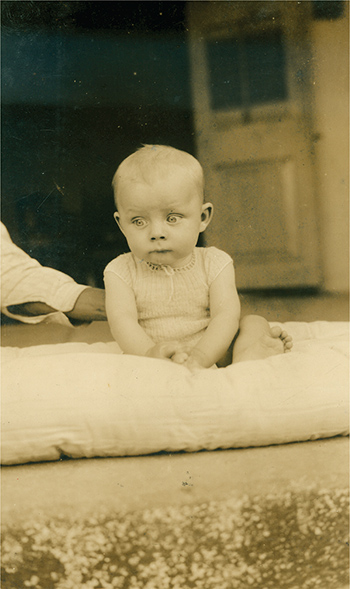
Pensive infant Ruskin Owen Bond in Kasauli, 1934.
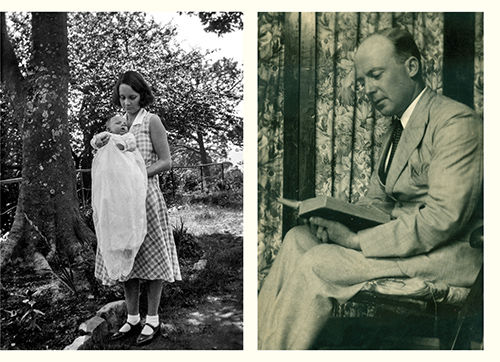
Top left: With my mother in Kasauli. Top right: Daddy.
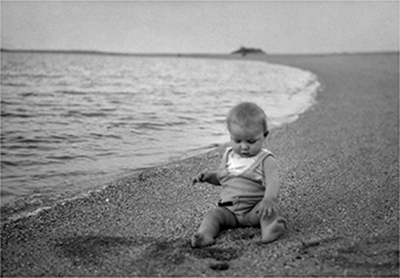
On the beach in Jamnagar.
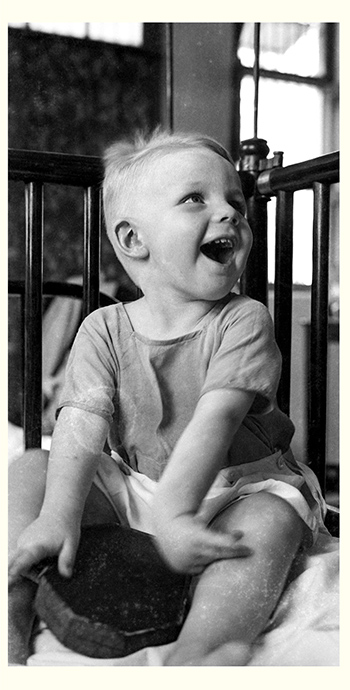
The little devil in Jamnagar.
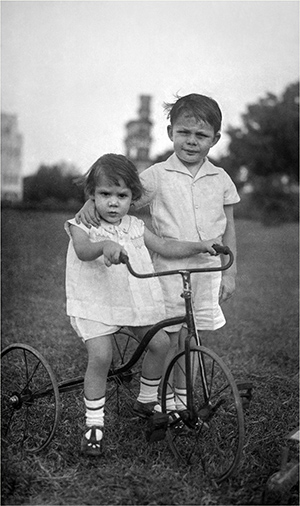
With my sister Ellen; taking a break from pushing her tricycle around the garden.
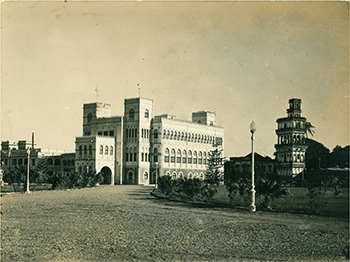
The Jamnagar Palace. The old palace, on the right, was where my father ran his school for the children of the royal family.
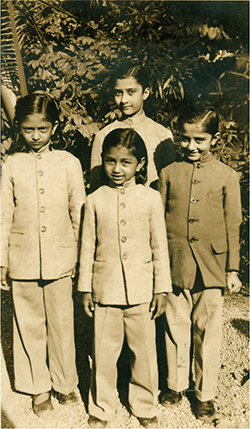
The Jamnagar princesses: Manha, Jhanak, Ratna and Hathi; my father’s pupils.

My mother at the Jamnagar aerodrome, before she went for a spin in a Tiger Moth plane with a prince from one of the neighbouring states.
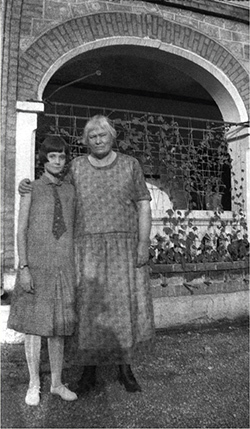
Dehra Granny with my mother (who would have been in school when this picture was taken).
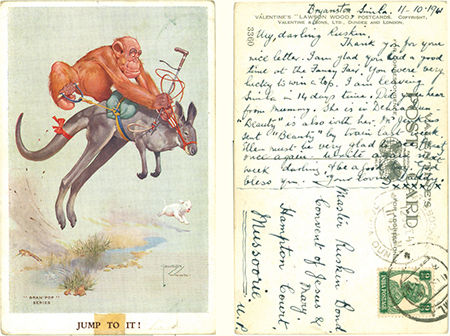
A postcard from my father, sent in 1941, when I was at school in Mussoorie.
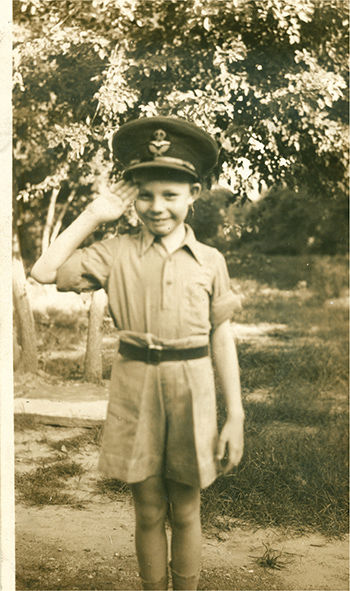
In Daddy’s RAF cap, outside the Humayun Road hutment in Delhi.
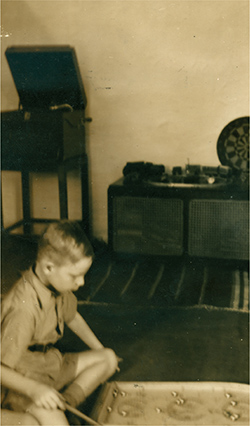
In my room on Atul Grove Road, with the gramophone (the black box standing on the left), bagatelle and dart board.
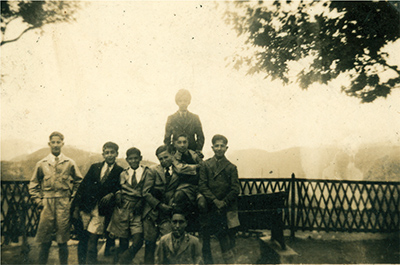
A rare picture of my friends at Bishop Cotton’s, taken with a ‘Baby Brownie’ camera, which was popular in the 1940s and ’50s. Sitting in front of the Sikh boy standing on the bench is Azhar.
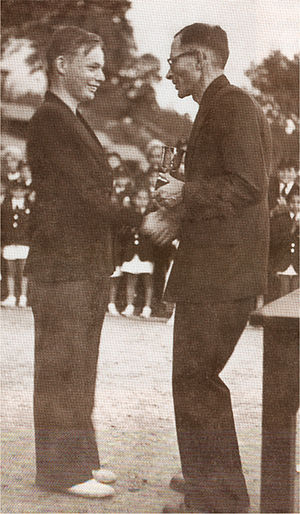
Receiving a trophy on sports day in senior school.
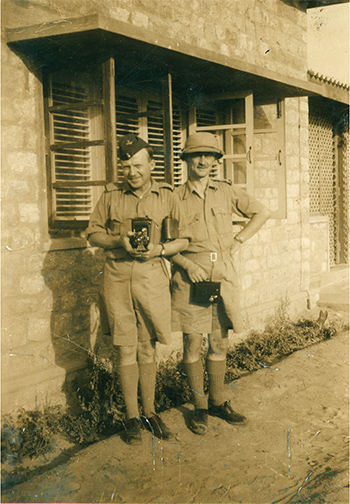
The last picture of my father, taken when he was posted in Karachi.
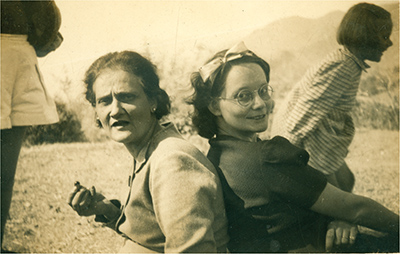
My mother and Aunt Enid on a picnic in Dehra in the mid 1940s.
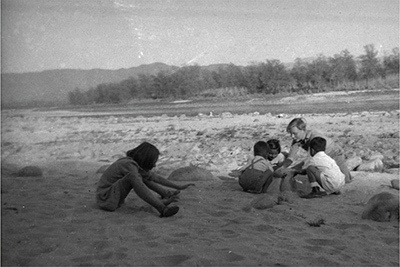
Ellen and I with some young friends near the Jamuna river just outside Dehra.
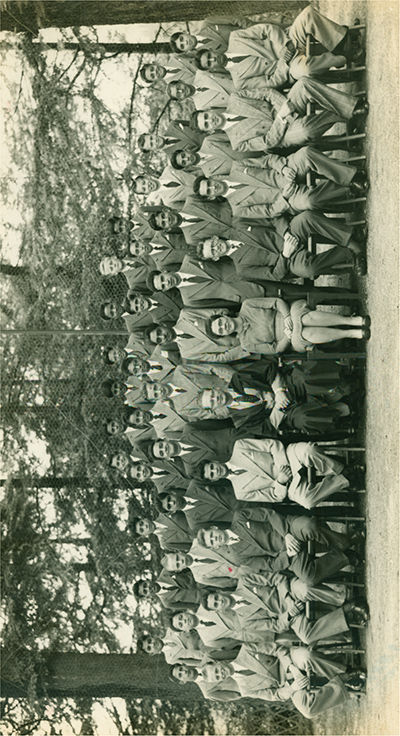
My house in school, Ibbetson. This photograph was taken just before Partition. Several of the boys here would soon leave for the newly created state of Pakistan.
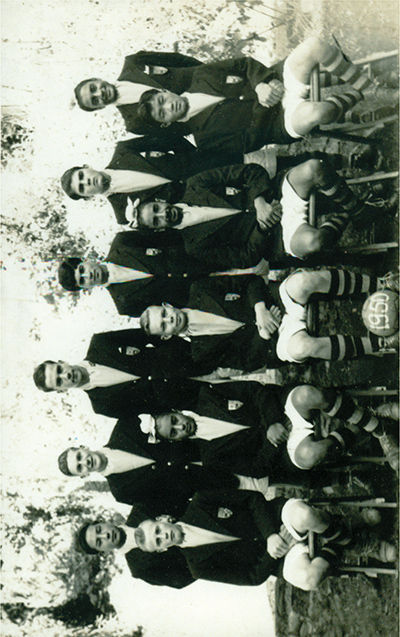
The Bishop Cotton’s football team of 1950. I’m in the centre, with my good friend Kasper, a German, standing behind me. The others are Boga, an Irani boy; Lama, from Nepal; Plunkett, an Anglo-Indian boy; a Sikh boy, Jogi, and his brother Nepinder; Shakabpa, a Tibetan boy; Hemender, one of the sons of the late Maharaja of Patiala; an Austrian boy, Kruschandel; and Hilton, an English boy.
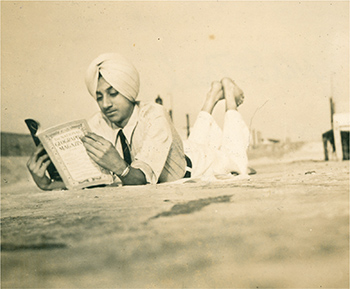
Haripal, reading a National Geographic issue, outside my room on the roof in Dehra, 1951.
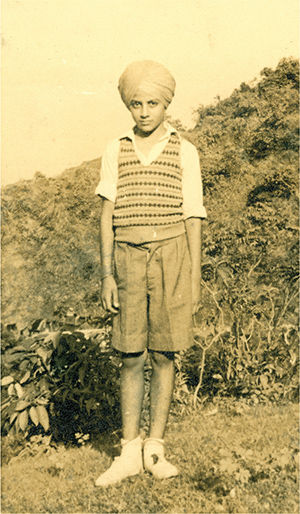
Somi.
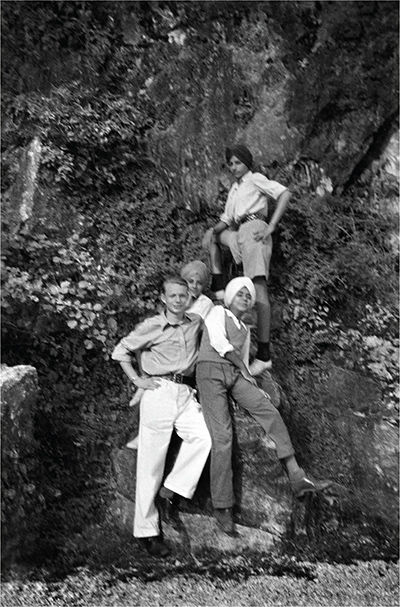
With Somi, Dipi and Daljit on one of our excursions from Rajpur to Mussoorie.
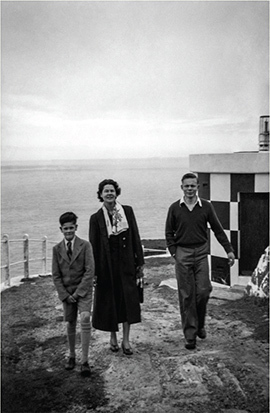
With Aunt Emily and her son in Jersey.
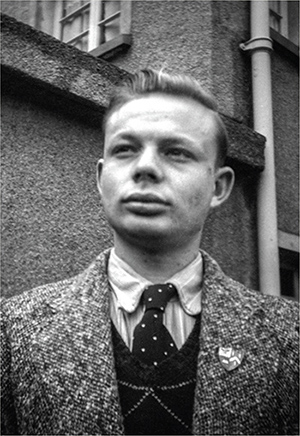
Possibly the only photograph of me in London.
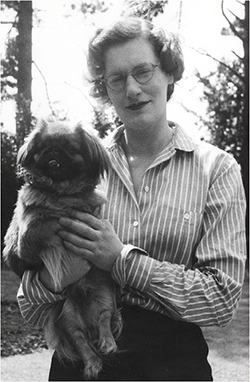
Diana Athill, my first editor.
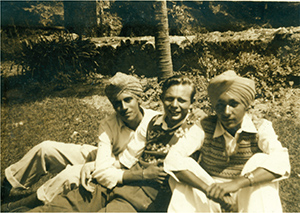
With my Sikh friends in Dehra after my return from England in 1955.
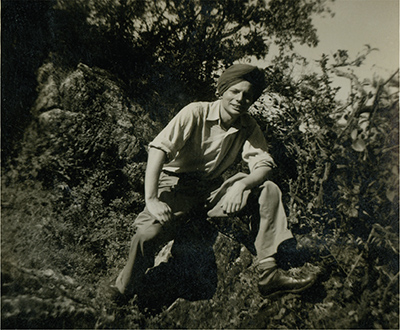
And as a Sikh myself.
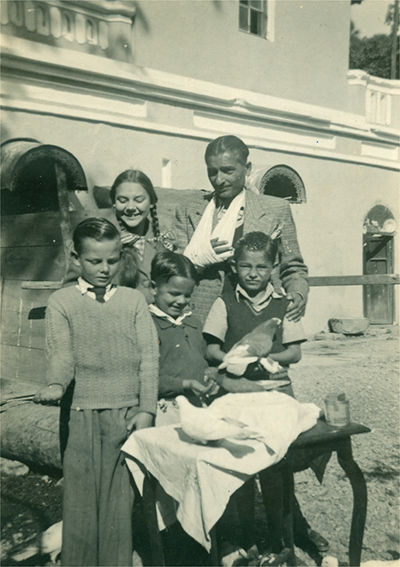
My stepfather with Ellen, William, and my half-brothers Harold and Hansel.
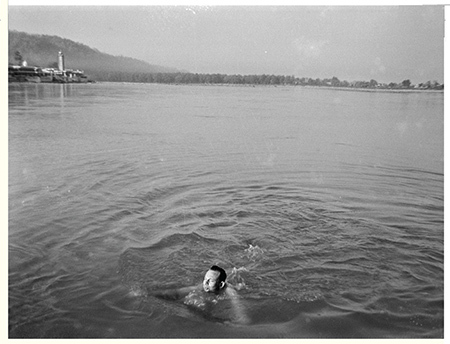
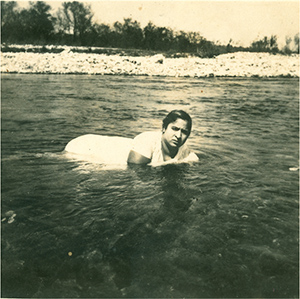
Bibiji and I in the Ganga—I ventured a little further into the water than she did!
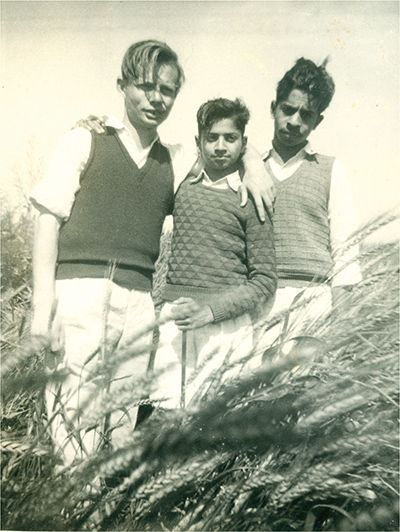
In the fields near Rajouri Garden in Delhi, with Kamal (in the centre) and one of his brothers. This was back in the late 1950s; there are now shopping malls and flyovers where this picture was taken.
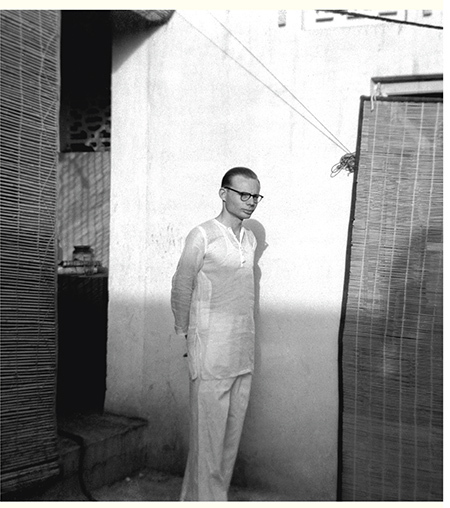
The poet of Delhi, in Patel Nagar. (Ghalib would have approved!)
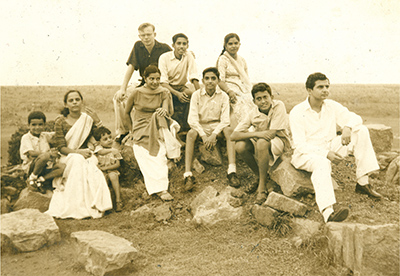
On a picnic in Tughlakabad, Delhi.
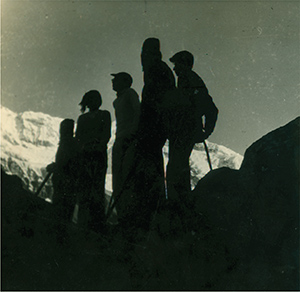
At the end of a trek to the Pindari Glacier in 1960.
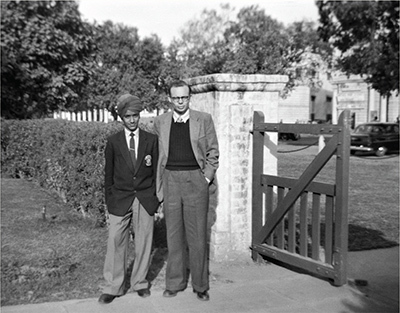
With a friend outside the CARE office in the old Theatre Communications Building in Delhi’s Connaught Place area.
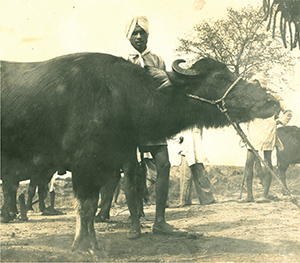
The ‘blue-eyed’ buffalo I bought for young farmers in Ropar as part of my duties with CARE.
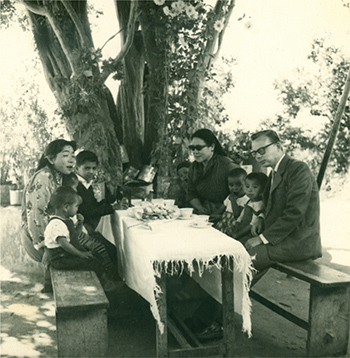
With the Dalai Lama’s sister, whom I met as a representative of CARE in Dharamshala in 1960 or ’61.
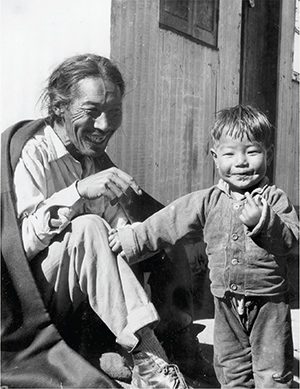
Father and son— Tibetan refugees in Darjeeling.
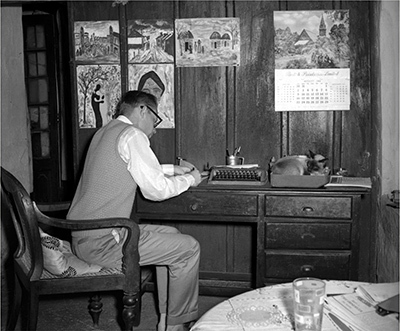
Writing in Mussoorie.
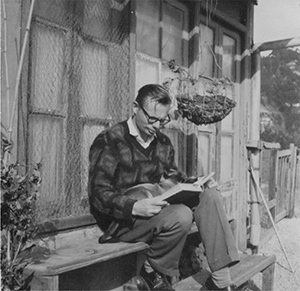
Reading in Mussoorie.
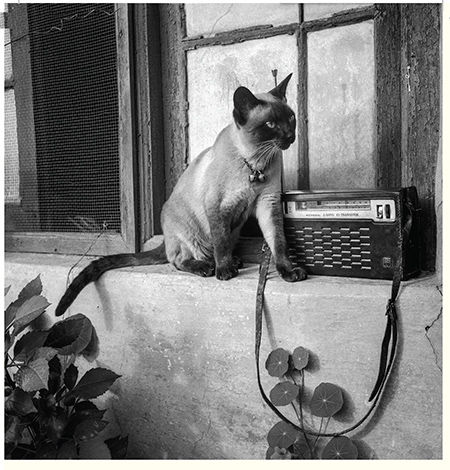
Suzie the cat listening to the radio.
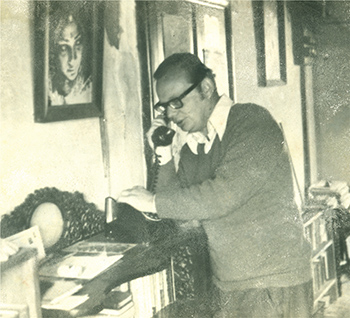
On the telephone in Maplewood in the 1970s— probably speaking to R.V. Pandit, proprietor of Imprint magazine, who was responsible for my joining the tiny club of Mussoorie residents with a phone connection.
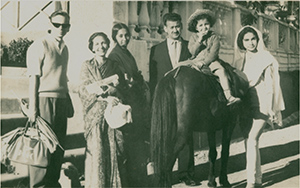
Preparing for a picnic below Maplewood Lodge with Hetty Pimm, Surekha Sikri and other friends.
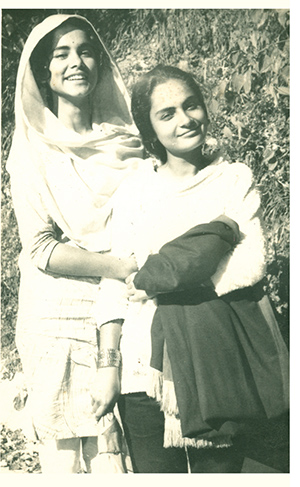
Surekha and her younger sister Phoolmani
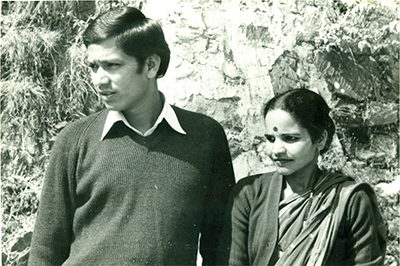
Prem and Chandra; the beginning of my family.
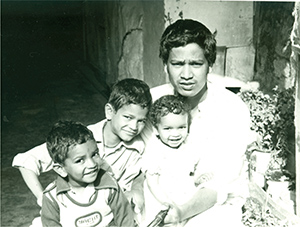
Prem with his children—Rakesh, Mukesh and Dolly.
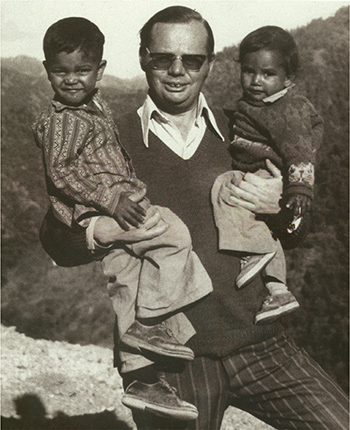
Out on a walk with Rakesh and his brother Suresh, whom we lost when he was barely two.
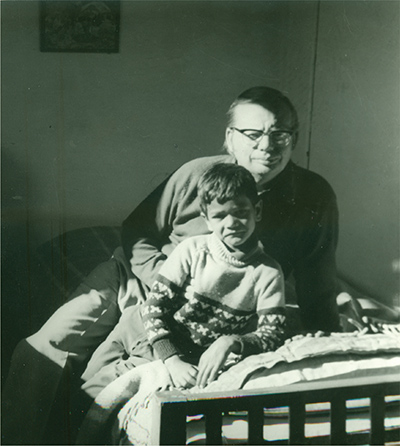
With Rakesh, shortly after we moved to Ivy Cottage.’
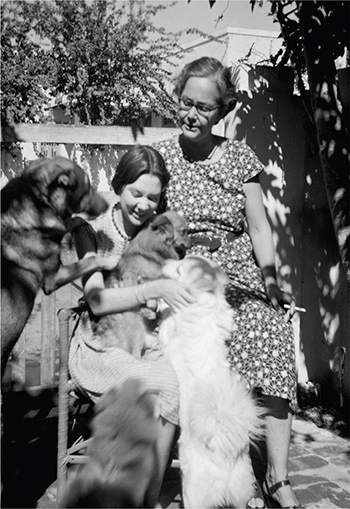
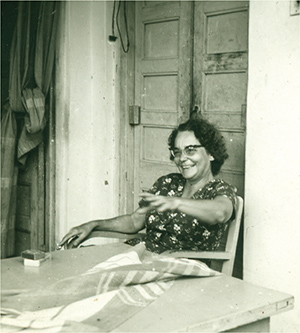
My mother in her final years—with Ellen (above) and just before her operation.
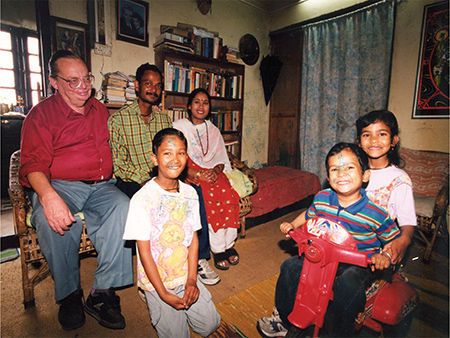
With my family—Rakesh and Beena, and their children, Siddharth, Shrishti and Gautam.
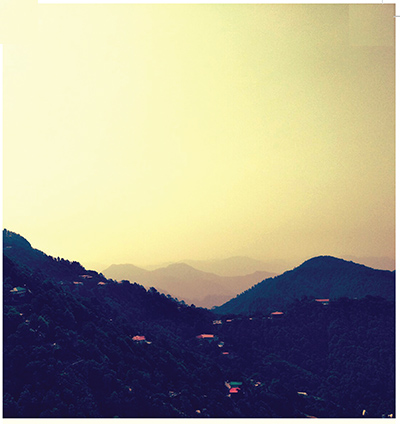
The view from my window
The following year, Mandy serialized the sequel, Vagrants in the Valley , another of my productions from Bibiji’s flat. The Room had been written out of my homesickness and longing for India. Vagrants was written in Dehra, after my return, and lacked some of the youthful optimism of my first book; but it had more of my sensuality, for Dehra was a sensual sort of place, the summers steamy and subtropical. Andre Deutsch wasn’t enthusiastic about this second novel, and it was never published outside India.
Another story that Deutsch turned down (and lost the manuscript), because it was too short to make a book, was a little novella called Leopard in the Lounge . Fortunately, I had made a carbon copy of the typescript (no photocopiers in those days), and as it was too long for a Sunday magazine, I sent it to P. Lal, who ran a small literary publishing house in Calcutta called Writers Workshop. He sat on it for twenty years. Like ‘The Green City’, I presumed that it had been lost forever, and I was quite philosophical about the loss of manuscripts in publishers’ offices. Then one day in the early 1970s, I received a packet from P. Lal enclosing the story, with a rejection slip attached! I put it aside for another ten years. Then in the late 1980s, when Penguin India was publishing collections of my short stories, I revised and edited the story a little and changed the title to ‘Time Stops at Shamli’. It became the title story of a new collection, and till today it remains a favourite with many of my readers.
Chance gives, and takes away, and gives again!
To return to Bibiji.
She had acquired a certain amount of independence with her little provision store, and she certainly did not miss her husband. She was in her mid or late forties now; her daughter was married to someone in Amritsar, and her son was in a boarding school. Her closest friend was Mrs Singh, who lived in the adjoining flat and was ten or twelve years younger. Bibiji and Mrs Singh got on beautifully. You could say they were made for each other. Mrs Singh was married to a police inspector, who came home occasionally from wherever he was posted, and she had a son, Ajay, a boy of twelve who was addicted to lollipops and thoroughly spoilt.
During the day Mrs Singh sat in the shop, smoking a hookah, a custom apparently quite common amongst the villagers of her district, and observing the customers. And afterwards she would entertain us with clever imitations of the more odd or eccentric among them. In the evening she would help Bibiji prepare dinner, and sometimes I would join them after my dhaba dinner for a story or gossip session. The two friends would make themselves comfortable on the same divan, wrap themselves in a razai or blanket and invite me to sit on a charpai next to them and listen to their yarns or tell them a few of my own.
I would climb up to my room, but they would continue talking late into the night, and afterwards there would be a good deal of activity in that divan bed. Mrs Singh would double up with Bibiji even when her police inspector husband was home on leave. He did not appear to find anything unusual in his wife’s intimate relationship with Bibiji. His mind was obviously on other things, or he was a good man who understood a thing or two about love.
Mrs Singh was an attractive woman, and a rather good storyteller who entertained me with stories, mostly of the supernatural kind, about life in her village near Agra. At twilight, sitting on her charpai and puffing at the hookah, she would launch into accounts of the various types of ghosts that one might encounter: prets (mischievous ghosts), churels (the ghosts of immoral women, who had their feet facing backwards), various other spirits and goblins, and people who were reincarnated as buffaloes or snakes or sarus cranes. She once told me of the night she had seen the ghost of her husband’s first wife. The ghost had lifted Ajay, then a few months old, out of his cradle, rocked him in her arms for a little while, and announced that she was glad the child was a boy and a sweet one, too—a sentiment not shared by those who knew the brat.
Mrs Singh gave me some of my early ‘ghost’ stories—‘The Haunted Bicycle’ (those buffalo children), ‘Have You Ever Been In Love With a Ghost?’ (sadly, I’ve lost this one), ‘A Face in the Dark’ (that faceless school boy), ‘The Bent-Double Beggar’, and others. I don’t think she had been to school, and she spoke in her own quaint village dialect, but I had no difficulty in following her; her gestures and facial expressions always helped the stories along.
She always referred to me as ‘the road inspector’ because of my habit of walking all over the town—through the bazaars, to the railway station, into the tea gardens…In quest of what, she would ask. What could I tell her? That I went looking for stories, adventure, romance? But these things usually came to me when I wasn’t looking for them. I gave her the only reason I could think of: I was just a champion walker! Mrs Singh did not approve, and together with Bibiji, she would make plans to get me married. When I protested, saying I was only twenty-three, they said I was old enough. Bibiji had an eye on an Anglo-Indian schoolteacher who sometimes came to the shop, but Mrs Singh turned her down, saying she was too thin and would have trouble bearing children. Instead, she suggested the daughter of the local padre, a glamourous-looking, dusky beauty, but Bibiji vetoed the proposal, saying the young lady used too much make-up. Both finally agreed that I should marry a plain-looking girl who could cook, use a sewing machine, and speak a little English.
They did not know it, but I was enamoured of Kamla, a girl from the hills, who lived with her parents in quarters behind our rooms. Whenever I passed her on the landing, we exchanged pleasantries and friendly banter; it was as though we had known each other for a long time. But she was already betrothed, to a much older man, a widower, who owned some land outside the town. Kamla’s family was poor, and it was to be a marriage of convenience. There was nothing much I could do about it—landless, and without prospects—but after the marriage had taken place and she had left for her new home, I befriended her younger brother and through him sent her my good wishes from time to time. She is just a distant memory now, but a bright one, like a forget-me-not blooming on a bare rock.
Mrs Singh left Dehra some years later. Bibiji continued to run her shop for several years, and it was only failing health that forced her to close it. She sold the business and went to live with her daughter, who was by then in New Delhi. There she lived on into her eighties, despite very high blood pressure and diabetes.

Most of my old Dehra friends had finished their schooling and joined colleges in other parts of the country. Except Krishan, and he too would soon be leaving.
But there were others to take their place—teenagers struggling to do their matric or intermediate, or young men in college, aspiring for their arts or science degrees. College was a bit of a dead end. But those who had their schooling in Dehra and then moved on usually did well for themselves.
Like the Dilaram Bazaar boys, Gurbachan, Narinder and Sahib. Gurbachan was an average student, but after doing his intermediate he went to stay with an uncle in Hong Kong. Ten years later, he was a superintendent in the income tax department. Narinder was always having to take tuitions to scrape through his exams. But he spoke English quite well, and he had a flair for business. Today, he owns the largest wholesale wine business in the UK (and as he doesn’t drink himself, it’s profit all the way). Sahib went off to England, and for some years worked as a clerk in an office and wasn’t doing very well. Then he started making samosas and supplying them to various cafes and restaurants, and soon became the samosa king of London.
These boys, and others like them, came from middle-class families. It was impossible, then, to foresee what life held in store for them. And it wasn’t always happy endings. Sudheer, a charming young scamp, went on to become the assistant manager of a tea estate in Jalpaiguri, and was bludgeoned to death by the tea garden labourers.
My own future was a little easier to predict. In a sense, I had already arrived. At twenty-two I was a published author and had written many stories for newspapers and magazines, although not many people had heard of me. Of course, I wasn’t making much money then, and probably never would, but it was the general consensus among my friends that I was an impractical sort of fellow and I would be wise to stick to the only thing that I could do fairly well, which was putting pen to paper.
At the time, I was the only one earning any money, and I would pay for the chaat and tikkis we consumed near the clock tower. Sahib and I had tikki-eating contests, which I usually won, and regretted the feat immediately after, when it was time to pay the bill. But it was good to have fun, and soon I would be walking up to Mussoorie with my friends for some more loafing about and eating snacks. We would walk up quite regularly from Rajpur to Mussoorie on the old bridle path. By this footpath it was just seven miles to Mussoorie. In two and a half hours we would be in the Mall, where we would loiter, have a cheap lunch of puri-chhole at the Sindhi Sweet Shop, and then go back in the evening to Rajpur and catch a bus into Dehradun.
There were a couple of other interesting friends I acquired during this time—older, with respectable-sounding jobs and expensive habits, but often broke and in need of money, which they seldom returned.
There wasn’t much work for anyone in Dehra. Only lawyers seemed to thrive there in those days, possibly because they also doubled up as property dealers. My neighbour, an income-tax lawyer, spent more time wheeling and dealing over property sales or disputes than he did in the income-tax offices which were next door. Although he had an office right next to my room, he was usually to be found in the bar of the Royal Café, downing countless whisky-and-sodas with his clients or cronies. This was just routine drinking. If he collected a large fee, he would go on a real binge and we wouldn’t see him for days.
He employed a Nepali messenger boy, Sitaram, who had nothing to do except sit on a chair on our shared balcony—in the shade if it was summer, in the sun if it was winter, and just inside the door in the monsoon. Sometimes I shared my boiled eggs with him (I was good at boiling eggs) and we became friends, and he ended up doing more work for me than he did for his employer.
The lawyer’s name was Suresh Mathur, and he was a fan of P.G. Wodehouse’s humorous novels. When talking to me he would address me as ‘dear old chap’ or use expressions such as ‘Good egg!’ or ‘Tally-ho!’ He must have been an Englishman in a former existence. He was the Bertie Wooster type, but unfortunately he did not have a Jeeves to keep him out of trouble. Staggering into his office after a morning’s hangover, he would sometimes be wearing the wrong socks—a purple sock on one foot and a yellow sock on the other. With that combination, Wooster would never have got past Jeeves.
Suresh liked wearing a tie, but it was usually the same tie—a ragged affair which looked as though it had also served as a collar for a dog. It had been given to him by a lady-love many years ago, and Suresh liked to wear it for sentimental reasons, even though the lady had married someone else.
‘What ho! What!’ Suresh would greet me in true Wooster fashion, proof, if it were needed, that the last Englishmen were to be found in India. He would arrive in his office at noon, drop all his mail, unopened, into a waste paper basket, and invite me to join him for a drink at the Royal Café. After a couple of large gin-and-tonics he would expound on the English poets of the 1890s (he had studied them at college), the state of the universe, and his favourite topic, the ‘fourth dimension’. Till today I have no idea what he meant by the fourth dimension, but he would hold forth on the subject for an hour or two, finally ending by staring gloomily into his empty glass where, presumably, the fourth dimension revealed itself to him.
But Suresh was a survivor. He owned an old house in Rajpur which he had inherited from his father. A year or two after I’d left Dehra I heard he’d sold the property for a good sum to a prosperous widow, a former princess, who lived nearby. Not long after, he married the widow, his senior by some years, and got the property back (for nothing). When I met him in the Royal Café a couple of years later, I told him he’d made a smart move, a remark which seemed to offend him: he assured me that he was genuinely in love with the princess. And he paid for the drinks—a rare event—and told me that the house was up for sale again! Apparently, they were thinking of moving to Delhi. Good old Suresh. I don’t think he ever did a stroke of work in his life.
If a lawyer could be hard up, what chance had a journalist? William Matheson, in his mid-thirties, had everything going for him when he came out to India as an assistant to Von Hesseltein, a correspondent for some of the German papers. Von Hesseltein passed on some of his assignments to William, and for a time all went well. William lived with Von Hesseltein and his family, and was also friendly with Suresh, often paying for the drinks at the Royal Café. Then William committed the folly of sleeping with the boss’s wife. He justified this indiscretion by telling us that Von Hesseltein was sleeping with a strapping young man in his twenties whose father owned a dairy near the bazaar. William obviously felt that the wife was getting a raw deal, and if his boss preferred the roller to the brush, the arrangement would make everyone happy. But Von Hesseltein was not the understanding sort. He threw William out of the house and stopped giving him work.
William hired an old typewriter and set himself up as a correspondent in his own right, living and working from a room in the Doon Guest House. He bombarded the Swiss and German papers with his articles, but there were very few takers. No one then was really interested in India’s five-year plans, or the Bhakra-Nangal Dam. William wanted to write a book about his experiences in the French Foreign Legion, which he was convinced would be both a critical and a commercial success, but the book never got written. After two or three drinks at the Royal Café he would regale us with tales of his exploits in the Legion, before and after the siege of Dien-Bien-Phu in Vietnam. Some of his stories had a ring of truth, others (particularly his sexual exploits) were obviously tall tales; nevertheless, I was happy to pay for the beer in order to hear him spin them out.
Another reason why I didn’t mind paying for William’s drinks was his rather good literary judgement. In Dehra in the mid ’50s there were few, if any, literary influences and certainly no literary atmosphere. William would dissect and tear my stories to bits, and this had a salutary effect on my over-writing. His praise was so sparing, that when he did say something was good, I knew it was good.
William shifted to Meerut a little later. He married and moved in with an Anglo-Indian girl from a fairly affluent family who had fallen for him. I was living in Delhi then, and he would invite me to his ‘marital home’ whenever I had a free weekend, Meerut being just two hours by bus from Delhi.
William lived with his wife and father-in-law in the Meerut cantonment, in a large bungalow with stables at the back. The father-in-law, Captain Sualez, retired from the army, was a legendary racehorse owner and trainer—in those days, the Meerut racecourse was even more popular than the Delhi racecourse, because it was patronized by the army. The captain was an eccentric old man who moved about town in a pony trap, and preferred horses to people. Except his daughter, a lovely dusky girl of whom he was very fond. He had married an Indian lady who worked as an ayah, but she was long dead and he had raised his daughter on his own. He resented William and put up with him only out of love for her.
None of this affected my stay there; the captain seemed happy to have me, if it meant I would keep William out of the house!
When Captain Sualez died, the daughter inherited his considerable money and properties and lucky William took her with him to scenic Switzerland, where they lived happily ever after.
Some people got by on their charm and their wits.
Not having much of either, I had to bang away at my typewriter and turn out four or five stories or articles every month—in order to pay my rent; keep myself in clothes; buy the odd book and see the odd film (sometimes a late-night film with Sitaram); make the occasional small loan to Bibiji and treat myself to the occasional beer or ham sandwich; have something for postage on my manuscripts to the BBC or the Weekly or anyone who would publish them; and get myself a pair of spectacles, for my eyesight was getting weaker by the day.
‘Sir, do you see those pretty girls walking down the road?’ Sitaram would ask me from his chair on the balcony. I could barely make out that they were girls, let alone pretty ones, and so I went to the local optician and started wearing glasses. The girls immediately came into focus, and of course they were all pretty.
In spite of turning out stories and articles for magazines and newspapers on a regular basis, it was becoming increasingly difficult to earn enough to cover my modest expenses. The Room had brought in very little in the way of royalties, although a generous advance for a German translation (Die Strassezum Bazar ), and fifty pounds that came with the John Llewellyn Rhys Prize the novel had won, had made things easier for a few months. But Rs 50 from the Weekly was about the best I could get in India for a short story. I did receive Rs 750 for the serialization of The Room , and roughly the same amount for its sequel, Vagrants in the Valley , but I ran through that money fairly quickly.
My mother kept urging me to come to Delhi where, it seemed, jobs were to be had for anyone who could speak and write English. Today, hundreds of thousands of boys and girls come out of English-medium schools, but in 1959 there were barely half-a-dozen of these schools in Delhi; if you came from an affluent family you were sent to a school in the hills (such as my old school), or to Doon School in Dehra or Mayo College in Ajmer.
In Dehra, I supplemented my income by giving a couple of tuitions to children at Cambrian Hall, a new school being run by the Mainwarings, the Anglo-Indian couple who had advised me to do the sensible thing and go back home the time I had quarrelled with my mother and left home. I received Rs 50 per month for giving the children an hour every morning. They learnt absolutely nothing from me but I persisted with them for three or four months, before Mrs Mainwaring took pity on me and ended my services.
Then there was Mr Dutta, who brought out a small weekly newspaper called The Frontier Mail (originally published from Quetta, I think), and once a week I would drop in at his press, in a gully off Paltan Bazaar, and help him with his editing and proof-reading. He did not provide anything new; just a rehash of stuff taken from the national newspapers. For my help, Mr Dutta gave me Rs 100 per month.
I wasn’t earning much, but I was certainly getting experience!
Mr Dutta had a fifteen-year-old son—frequently thrashed by his father but well-spoilt by his mother. Sudhir had wicked ways and an odd sense of fun. He had kept a young monkey and trained it to—putting it delicately—pleasure itself in public. Sudhir would ride around town on his bicycle, the monkey in a shopping basket strapped to the handlebar, and would stop outside shops or at street-corners, where the monkey would soon draw a small crowd, grinning mischievously while it proceeded to give a demonstration of what the Bible called ‘wasting’.
One day the boy was chased down the street by some angry shopkeeper. He parked his bicycle outside Bibiji’s shop, ran upstairs, and hid the monkey in my bathroom; then he took off from the back stairs. I was out at the time, but Bibiji had spotted Sudhir’s coming and going, and she came upstairs to see if all was well. Meanwhile the monkey had escaped from the bathroom and entered Suresh Mathur’s office, where it was greeted by a somewhat inebriated Wooster with a ‘What ho! How are you, old boy?’ Sitaram tried to drive the monkey away, but it simply made an amorous grab at him. Then Bibiji marched in with a jhaaroo, her small hand-broom, and gave it a wallop on the backside. The monkey leapt over the balcony, landed on the roof of a taxi that was probably heading for Mussoorie, and was never seen again in Dehra.
Sudhir’s exploits were many, and he was expelled from at least two schools, but this is my story, not his, and I shall keep him for another time.
And returning to my story—it was time to move again, for my earnings were becoming more uncertain by the week. I wasn’t unhappy about the prospect of moving to Delhi, but I wasn’t entirely happy, either. Would my freelancing days be over? What would Delhi make of me, and what would I make of Delhi, a city I hadn’t seen for fifteen years, and never as an adult…
But before I left there was an amusing ‘literary’ encounter. Dehra had a visitor, and a rather well-known one—G.V. Desani, who had written a wildly eccentric novel, All About H. Hatterr , in the late 1940s, which had got him a lot of attention. There was a Hindi writer, Bramh Dev, who ran a photo studio next to Bibiji’s shop, and it was at Bramh Dev’s that I met Desani. He was going around with a petition nominating himself for the Nobel Prize for Literature. He had already got Bramh Dev’s signature, and Nergis Dalal’s (Nergis, who lived in Rajpur, had published some stories by then, and would soon publish a novel). Then he must have been told about another writer in the area, so he got Bramh Dev to send for me. I don’t think Desani knew anything about Bramh Dev or me, but he was looking for any and all writers to sign his petition. Everyone was so flabbergasted, no one refused!
A very odd man was Desani. He’d had a coffin made for himself and would sleep in it, dressed in his best clothes. I never saw this, of course. I never saw him after that day, in fact. He went away to teach in a university in America and spent time in some Buddhist monasteries. He wrote another book, a collection of short stories, when he was eighty or eighty-five, and that was all.
Well, I had neither the qualifications nor the desire to teach at fancy universities. I didn’t have the luxury of writing a book and a half and basking in the glory for ninety years.
‘Delhi is yet far,’ said a famous saint; but that was four hundred years ago. Now Delhi was just six-and-a-half hours from Dehradun, and to Delhi I went.

BUT IN DELHI, DURING THOSE EARLY MONTHS, I WAS MISERABLE.
The words were not coming. I couldn’t write a thing. I was troubled by a recurring stomach ache. And the promised job had faded away, and so had my savings; not that I had anything to save, but there had at least been the occasional cheques and even those had dried up. Moreover, we were living (my mother and stepfather, brothers and sister) in the furthest outpost of what was then New Delhi, in a refugee colony on the Najafgarh Road called Rajouri Garden.
This was 1959 and Rajouri Garden was just a scattering of small houses put up by Hindu and Sikh refugees from those parts of the Punjab that were now in Pakistan. Needless to say, there were no gardens. The treeless colony was buffeted by hot, dusty winds from Haryana and Rajasthan. The residents were having a hard time readjusting to life in India, getting work or setting up small businesses, and they had little time for flowers, even less for outsiders. But some of them let out portions of their houses, and as the rents were comparatively low, my stepfather rented a three-room set which included a small courtyard and a hand-pump.
That hand-pump made all the difference, because water was always a problem in Delhi (and continues to be to this day). The water from the hand-pump was clean, and could be used for cooking, washing clothes, bathing, even drinking if boiled. It wasn’t the water or the food that gave me stomach trouble (no one else was having a problem), it was just plain discontent and frustration.
To visit a bookshop or a cinema I had to travel to Connaught Place, and the journey by bus took about an hour. But buses were few and infrequent; one would have to stand on the roadside for a long time, waiting with a small crowd of commuters, and then struggle to get on to the bus which was usually full. You had to be a straphanger for most of the journey.
A couple of years previously the motor scooter had been invented, and this had resulted in the auto-rickshaw which could accommodate a couple of passengers. I would use auto-rickshaws whenever I could get one, but they were seldom to be found in Rajouri Garden. On several occasions, after seeing a film at one of the Connaught Place cinemas, I walked all the way back to Rajouri, a distance of five or six dusty miles, for the last bus would have returned to its depot.
This was not the Delhi of my childhood—that charmed circle of Atul Grove, Humayun’s Tomb and Connaught Place, where all good things were within easy reach. Everything was too much work now! And where were all the trees? How I longed for those idle hours at Dehra’s little Royal Café. How I missed my bicycle-riding friends from the Dilaram Bazaar. And Dehra’s little bookshops, and the litchi trees, and my lamp-lit room above Bibiji’s love den and kirana store.
I longed to return, but I felt I had to stick it out for a couple of years, find a job that would pay me a decent salary, and save a little money before making another bid for freedom, the sort of freedom that only successful freelancing could bring me.
I finally made my peace with Delhi—even with the harsh summer, when muggy nights would end in the briefest of dawns and then the sun would come shouting over the rooftops. Gradually, I grew to like the smells of summer: The delicate odour that arose when water was sprinkled on the hot terrace floor in the evening, before it was time to lie on a charpai under the open sky. The smell of a freshly cut cucumber and of khus-and rose-sherbet syrup. The sweet, fleeting scent of raat ki rani, the night-blooming jasmine, on the evening breeze, along with the stronger scents of mango blossom and cowdung smoke—for this was long before LPG cylinders, and kerosene stoves were infrequently used. Chulhas, clay ovens fed with wood and dried cowdung cakes, were popular and economical.
But it was my old trick—walking—that I finally used to ferret out Delhi’s elusive charms. Summer and winter, I scorned the dust and the traffic, and walked all over Delhi—from Rajouri Garden to Connaught Place, of course, but also from Daryaganj to Chandni Chowk, and from Ajmeri Gate to India Gate—investigating historic streets and buildings, or simply sitting on the grass near the India Gate canal and eating purple, tangy jamuns with a little salt.
In Kashmere Gate, there was a quiet restaurant near the Ritz cinema hall—already decrepit—which I began to frequent. After a film show or a good meal of kababs and tandoori rotis, I would walk on to Maiden’s Hotel, once the most popular hotel in Delhi. It had come up during the Delhi Durbar, I think, and it was named not after a pretty milkmaid, but after its owner and founder, John Maiden. Its architecture was most impressive, and I would visit it from time to time to gaze upon its façade—but I did not step in, for fear of losing a lot of money.
About that time the Maiden’s was being used as a set for a British film about World War II called the The Wind Cannot Read , which starred Dirk Bogarde and the beautiful Yoko Tani. Most of the hotel had been converted into a wartime hospital for the purposes of the story. There was also a scene at the Red Fort, which I witnessed. It depicted the Diwan-i-Khas, a pavilion where the Emperor Shah Jahan would spend a couple of hours every evening before retiring for the night. The words of the poet Amir Khusro, which I had seen inscribed in Urdu above the arches of the pavilion as a child with my father, were still there (as they are today): ‘If there be a paradise on earth, it is here, it is here, it is here.’
The view across the winding Jamuna must have been a splendid one six hundred years ago; but by the late 1950s the Jamuna was already a polluted river, and the colonies across it, such as Shahdara, were drab and depressing.
Far better views, I discovered, were to be had closer to Rajouri Garden. The houses were built on one side of the Najafgarh Road. On the other side, as yet uncolonized, were extensive fields of wheat and other crops that stretched away to the west and the north. I would walk across the main road and into the fields, finding old wells, irrigation channels and the occasional scarecrow, and sighting birds and small creatures that no longer dwelt in the city.
Some way down the Najafgarh Road was a large village pond and beside it a magnificent banyan tree—the kind you wouldn’t find in any city today, for healthy banyans need so much space in which to spread their limbs and live comfortably. That was the biggest banyan I had ever seen, and I got to know it quite well. It had about a hundred pillars supporting the boughs, and above them there was a great leafy crown, an enormous, generous canopy. It has been said that whole armies could shelter in the shade of an old banyan, and probably at one time they did. I saw another sort of army: mynahs, sparrows, rosy pastors, crested bulbuls without crests, brown-headed and coppersmith barbets, jungle babblers and many other birds crowding the tree in order to feast noisily on big, scarlet figs. Squirrels darted up and down the great bark of the tree, stopping now and then to sniff the air. Flashy parakeets wheeled in and shot out, screeching just because they wanted to screech.
Even further down was a large jheel. One could rest in the shade of a babul or keekar tree and watch kingfishers skim over the water, making just a slight splash as they dived and came up with small glistening fish. I would spot one of these beautiful birds perched on an overhanging bush or rock, and wait patiently to see it plunge like an arrow into the water and return to its perch to devour the catch. It came over the water in a flash of gleaming blue, shrilling its loud ‘tit-tit-tit’.
Late one morning, in the midst of a sea of wheat I found a camel going round and round a well, pulling up buckets of water. At my approach the pigeons flew out of the well, and a flock of parrots set up a racket in a nearby banyan tree, this one a little smaller, but no less hospitable to birds and squirrels. A village boy was sleeping in the shade of the tree, his striped pyjamas rolled up to his thighs. A flute lay beside him. Here, suddenly, I had come upon a corner of India that hadn’t changed in hundreds of years. It would change before long, but at that moment it was a picture caught in time: the old well, the camel, the pigeons, the parrots, the banyan tree, the boy and the flute. And I wrote a little story around it, called ‘The Flute Player’.
The boy, when he woke up, was friendly enough, and introduced me to his camel. The camel acknowledged my presence by continuing to look bored and supercilious and to traverse slowly around the well. The parrots returned to the tree to gossip, the pigeons to the dark recesses of the well to meditate. The boy even played his flute for me. I noticed that he had two thumbs; one large and one small. He seemed quite proud of them. Two thumbs are supposed to be lucky.
‘Don’t you go to school?’ I asked
He gestured towards his village, a speck in the distance. ‘When the school is ready I will go to it.’ And meanwhile he could look after the camel and sleep beneath the banyan tree.
‘Stay lucky,’ I said. And I saw him from time to time.

The transistor radio was another nice distraction in those years. It was a relatively new innovation, and a real craze. Just as today every youngster carries a mobile phone, in the late 1950s and early ’60s, everyone had his or her portable transistor radio. Whether you were in a bus or an office or a roadside café, you were forced to listen to the latest cricket commentary, even though Indian victories were infrequent, to say the least.
The stars and heroes of the era were Vinoo Mankad, a great all-rounder; Vijay Manjrekar and Chandu Borde, both stylish batsmen; Vijay Merchant, a fine opener; Polly Umrigar, a big hitter once he got going; and Subash Gupte, a wily spinner. Our fast bowlers were mere trundlers. When the powerful West Indies team came to Delhi, and was leading the series 3-0, I had just arrived in the city, and I joined the hordes at the Feroze Shah Kotla grounds to watch the final Test. The seats were all sold out, but I managed to climb the walls of the Kotla, where I joined a rowdy crowd of young men armed with oranges—just in case India lost, which seemed likely. From this vantage point (unpaid for) you could see only one end of the pitch, the bowler but not the batsman, or vice-versa at the end of an over; but this was good enough to keep you in the picture as far as the progress of the match was concerned. I had the satisfaction of seeing Chandu Borde score a century (or was it 98?) and J.K. Holt of the Windies do likewise, but my hero, Vinoo Mankad, was out for a duck. (During my sojourn in England I had kept up with his century at Lord’s). Anyway, India managed to draw this final Test match, and the crowd left the grounds in good humour. The oranges were consumed, or kept for the following week’s football tournament.
I did not see much football, but I did see some high-quality hockey matches at a little stadium just off Connaught Circus, behind the Madras Hotel. Here, young Ashok Kumar, playing for Indian Airlines, would display some of the wizardry of his father, the legendary Dhyan Chand.
Always eager to escape from Rajouri Garden, my life would revolve around Connaught Place—its cinemas, bookshops, cafés. Here I met my old friend Krishan again (‘Kishen’ of The Room on the Roof , if you haven’t yet guessed). Once a duckling with modest looks, he had grown into something of a swan; a very presentable and good-looking young man of nineteen. He had been an engineering student in Calcutta and was now planning to go to England for ‘further studies’. He was good company and we spent several evenings together, seeing films and frequenting the United Coffee House. Then he went away. He was always coming into my life at crucial junctures, and then disappearing again.
A new friend I made at this time was Kamal, a young man of about eighteen, and we were to be travelling companions for some years. His family lived in a flat down the road from us in Rajouri Garden—Bhabiji’s house, which became a second home for me in Delhi, but I’ll come to that shortly.
After six months or so in Rajouri Garden, we moved to Patel Nagar, which brought my stepfather a little closer to his place of work. He was working as a sales manager for Sikand & Co., on Janpath, and later with another firm that dealt in cars, Pearey Lal & Sons, as a works manager.
And, finally, I found employment too.
I was offered a job with CARE (Cooperative for American Relief Everywhere), which had only been active in India for a couple of years, and had a small office and staff of about a dozen people in the old wartime Theatre Communications Building in the Connaught Place area. The chief of CARE was a man called Oden Meeker who had set up offices in Hong Kong, Laos and other Southeast Asian countries, and had written a book called The Little World of Laos . His secretary, Hermie Michael, an Anglo-Indian lady, had given him a copy of The Room On the Roof . He had liked it and asked to see me. So I dropped in at the CARE office, had a chat with Oden Meeker, and was taken on as an administrative assistant, or field officer, on a monthly salary of Rs 500. Two months later I was given charge of CARE’s Tibetan relief programme, and my salary was upped to Rs 800, which was a princely sum in those days.
It was 1959, and the Dalai Lama and his followers had sought asylum in India after China annexed Tibet. Several thousand men, women and children had fled Tibet and trekked great distances to reach India, and they were given sanctuary in various hill-stations—Mussoorie, Shimla, Dalhousie, Darjeeling—as well as in the steamy jungles of Bylakuppe near Mysore, down south. CARE was among various foreign agencies providing food aid or equipment for these settlements, and my job was to visit these centres, assess their needs, make reports, even at times make deliveries.
There was a fair amount of travelling to be done; the job certainly kept me on my toes, for Oden Meeker was a man of impulse, and sometimes he would send me haring off to the hills in the middle of winter because there were children who needed bathtubs, or carpet-makers who needed handlooms, or old folk who needed beds and blankets and woodcutters who needed axes. CARE was to keep me busy for four years, and it wasn’t easy to find the time to write. I tried to put down at least a few hundred words a day, but few of them rang true.
The Dalai Lama himself was in Mussoorie’s Happy Valley at first. But it was too public. The government didn’t want him too much in the way, and there were also concerns about security, so he was shifted to Dharamshala, a charming little cantonment town in the Kangra Valley, barely on the map those days, which became the headquarters of the Tibetan government in exile. I visited Dharamshala just once, and it wasn’t my first tour for CARE, either. It was to Bylakuppe, in Karnataka, that I went first, and then to Dalhousie and Shimla in Himachal Pradesh.
The Indian government had settled a large number of Tibetan refugees in Bylakuppe. It had been just jungle till then, and the refugees had to clear it themselves and build their hutments—right inside the Coorg forest—and start agriculture. Sturdy Tibetans of the warrior Khampa tribe were mainly responsible for the clearing, and they went about their job cheerfully and efficiently. The refugees were having a tough time adjusting to the heat and many were falling ill. The government and relief agencies like CARE were doing what they could to help, and although my own role was very limited, it gave me a sense of satisfaction to be part of these efforts. Some of the frustration of being unable to write went away as I got more involved in CARE work. And the Tibetans were handsome people, smiling easily despite the hardship, welcoming me wherever I went.
An Indian organization that was also helping the refugees was The Council for Tibetan Relief, run by Sucheta Kripalani, wife of the prominent freedom fighter Acharya Kripalani, who had been president of the Indian National Congress at the time of Independence, but had resigned from the party soon after. That year, returning from Bylakeppe, I found Acharya Kripalani in the same compartment on the train from Bangalore to Delhi. Also with us was a young American man working for some other relief agency. The American got into an argument with Acharya Kripalani—a Gandhian Socialist who believed in swadeshi and the village economy and cottage industries. The American disagreed with him, saying India was going backwards, not forward, and spirituality and socialism were not going to bring any development. He was very passionate about India, and angry with a lot of people and a lot of things. But Acharya Kripalani was a very calm and reasonable man. He never got excited, and listened with interest to the young man, replying patiently and at great length, explaining why he thought the Western model of development—which Nehru was adopting—was not good for India. The argument went on late into the night, and never any good at arguments and confrontations, I remained just a listener. Kripalani finally persuaded the young American—or just let him tire himself out! In any case, the American finally went to sleep, and I turned to look at the dark night outside the window, where India, vast and timeless, slumbered.
Unlike Bylakeppe, Dalhousie was cooler, and easier for the Tibetan refugees to adjust to. There were about 2,500 of them in this beautiful but deserted hill-station. Before Partition, it had received most of its visitors from Lahore; now the hotels lay empty, even in summer. The Tibetans brought some colour and new life to the place. By mid-winter they were busy on their handlooms, weaving carpets and rugs.
I made three official visits to Dalhousie, and on one of these, I was branded a spy. You took a bus or taxi from Pathankot to Dalhousie, and I’d been told to meet the PWD people in Pathankot, also for some CARE work, before I carried on to Dalhousie. The PWD offices were by a canal that ran along the border with Pakistan. I did not know that it was a sensitive area, and decided to take a stroll along the pretty canal, taking pictures with my camera (I had developed a serious interest in photography around this time). This caused a bit of a stir, and I was sent for and the PWD engineer got very angry. I didn’t understand what the fuss was about, there was nothing secret there or anything of importance. I told the engineer this and went on my way. But I was reported to the local Intelligence department, on suspicion that I was an American spy, and when I reached Dalhousie, I noticed a couple of men lurking around in the hotel where I was staying. I wouldn’t have guessed they were intelligence men if they hadn’t done such a bad job of concealing themselves as they followed me everywhere I went for two or three days. Or maybe that was the idea—to let me know that I was being watched.
Finally, one evening, I asked the men to join me for a drink in the hotel bar. We finished a bottle of Rosa rum, and I was able to convince them that I was an Indian working for a foreign relief agency. It’s wonderful what a bottle of rum can achieve!
In Shimla, to my surprise, I found the Tibetan children living and learning in the premises of the old BCS prep school. The buildings had been deserted during the disturbances of 1947, when it was thought the prep school children would be safer in the main school, some distance away. Now, standing on the high ground above the playing field, memories came flooding back to me. This was where I had stood with my father in the summer of ’43, watching a medley of small boys shouting and running about on the dusty flat. Scores of small Tibetan children were doing the same thing now. Here, fifteen years earlier, I had fought or wrestled with other boys, or played hop-scotch, or sat in a quiet corner and read a book or a comic…
And the names, which I thought I’d forgotten, came back to me like a roll-call: Abbot, Blake, Bland, Chauhal, Kellnar, Mirchandani. And dear Azhar. I turned away with a dull ache in the heart.
But I was comforted by the sight of the new children in the old field. It is good that life carries on. Those who had replaced us, from toddlers to teenagers, had come trudging through the snows and high mountain passes, accompanied by parents who had followed their revered Lama into a land which had its own myriad problems but which nevertheless gave them food and shelter and sanctuary. I sanctioned whatever they had requested from CARE—writing materials, and more tubs and beds—and returned to my hotel without visiting my old school, the senior school, probably because I was reluctant to stir up more memories of lost faces and times long gone.
On a similar expedition to Darjeeling, I was taking an evening stroll along the Mall when I heard a familiar voice call out: ‘Do you have my Henry Green?’
Henry Green was a novelist, now forgotten, popular with highbrows around that time. And the person who had accosted me was none other than Marie Seton, a person closely connected to films and film people. When I was in London I had been to see her edited version of Eisenstein’s uncompleted film, Que Viva Mexico , a semi-documentary work by the great Russian director who had made the silent classic Battleship Potemkin . Now Marie Seton was in India, writing a book on the films of Satyajit Ray, who had achieved international recognition with his Apu trilogy.
I had met her in Delhi—a woman full of enthusiasms (and criticisms), a little past middle-age, who loved talking. Someone, possibly Oden Meeker, had given her a copy of The Room ; she had been enchanted by it (or so she said) and insisted on meeting me. We met several times, usually in the evenings at Hotel India in Connaught Place—which later became Nirula’s—only a short distance from the CARE office. She could talk for hours, so you had to sit right opposite her for comfort. On the first occasion, I had sat beside her, and after half-an-hour had developed a severe crick in the neck. She talked about everything under the sun—films, film people, the British royal family and their little foibles, the intrigues that revolved around the Academy awards, British actors who were alcoholics, American actors who were gay, Italian directors who were sex maniacs—and I listened fascinated, because she was never dull. She seemed to know everyone who was anyone, from the Pope to Pandit Nehru, and knew a good deal that others did not know. Sometimes she would give me such details of what went on in the casting rooms of Hollywood and the bedrooms of the English royalty, that I blushed—and I don’t blush easily.
So what was she doing in the Darjeeling Mall, demanding the return of a book which I had never borrowed?
It turned out that she was watching Satyajit Ray at work—‘studying his methods’, as Watson would have said. Ray was making a film called Kanchenjunga , named after the majestic peak that was visible from parts of Darjeeling, and he and his crew were filming on the Mall, just around the corner from where I was talking to Marie Seton. In a break between takes she took me over and introduced me to the great man. Of course he’d never heard of me—I was little more than a failed author at the time—but he was very courteous, friendly, and invited me to watch the proceedings. I did for some time, but as I had to visit the Tibetan Centre, I left Mr Ray to the mercy of Marie Seton—she finally did write a book about him—and went about my business.
The funny thing was that we were all staying at the same hotel, a rambling old place called the Everest—not just Ray and his crew, but also a film crew from Bombay consisting of Shammi Kapoor and an actress called Kalpana, making a pot-boiler called Professor . While Ray was filming a realistic scene on the Mall, Shammi & Co were engaged in a sunny song-and-dance number on the railway tracks that served Darjeeling’s little toy train. The contrast in methods could not have been sharper.
I did not meet Mr Kapoor. But I did talk to his charming wife, Geeta Bali. She was not in the film, having given up acting due to poor health, but I remembered having seen her in a couple of films in 1949-50, before I left for England, and she was a good actress, very lively and spontaneous. She sat in the sun on the hotel lawns, looking rather lovely (the others were away, filming), and she smiled and took my compliments very graciously. A few months later she had passed away.

My tours were not limited to Tibetan relief centres. CARE’s donors, back in the USA, were keen on supporting educational, health and self-help programmes in India. I was given additional responsibility of the self-help programme, where my job was to visit village communities, doing things as varied as buying buffaloes for young farmers in Ropar, expounding on the merits of a steel plough as opposed to wooden ploughs (CARE was giving away steel ploughs), or providing sewing machines to groups of young women intent on subsidizing the family income. I had to pretend to be knowledgeable on many unfamiliar things. When, at the Ropar cattle fair, an elderly famer told me that buffaloes with blue eyes gave more and better milk than buffaloes with grey eyes, I believed him. I bought the blue-eyed buffalo and presented it to the young farmers—a group of village boys who had formed their own cooperative. They told me I had been fooled, but nice boys that they were, they also added that it was nice to have a pair of blue eyes to gaze into!
The self-help programme took me to many places in Punjab and Uttar Pradesh, and I would often take detours to places of historical interest. I went to Lucknow a few times by road, and stopped at Shahjahanpur. It had been my father’s birthplace, and it was also the scene of a well-documented massacre in the cantonment church during the 1857 rebellion. A girl of mixed race had survived the killings and had left some account of her escape and the refuge given to her by local people, both Hindu and Muslim, and I had been toying with the idea of writing a novel inspired by her story. So I took the opportunity to visit the area where these dramatic events had taken place—the church, the parade ground, the neighbouring mango-tope or ‘bagh’. Very little had changed in this sleepy old town. A monument to the fallen (since removed, I’m told) stood near the church. And there was still a bridge of boats across the little river Khanaut. The visit helped me to flesh out the story, and it was published as a short novel, A Flight of Pigeons , some years later.
I was going through my ‘historical’ period, as far as my writing was concerned. Free on most weekends, I would make short visits to places within a day’s bus-ride of Delhi: Agra, where I found the grave of John Mildenhall, the first Englishman to spend some time in that city, during Akbar’s reign; Sardhana, where the remarkable Begum Samru, a former nautch girl, had ruled with her mercenary army in the eighteenth century and amassed great wealth; Hansi, where Irish adventurer George Thomas had once held sway. And, of course, sacred Mathura and Brindaban, so closely associated with the youth of Lord Krishna. The fields and lakes around Mathura still teemed with bird life—acrobatic blue jays, large parties of screeching parrots, peacocks flaunting their beautiful tail-feathers, herons perched on the backs of buffaloes. Sarus cranes—usually in pairs—waded in shallow water-bodies, and golden orioles and scarlet minivets sat in the ancient trees, like jewels set in a green canopy. A feast for bird-watchers, but my time was always limited, and I could only dwell briefly on these avian delights. One day, I would tell myself, perhaps I would live closer to Nature’s beauty.
Meanwhile, some of my historical essays went into The Illustrated Weekly . That august periodical never received much respite from my attentions, at least not until the 1970s, by which time good Mr Mandy had retired and gone to live alone in a tiny uninhabited island he had bought in the Indian Ocean. It could only be accessed by boat when the tide was high. He fled some years later, having had quite enough of his own company.
And I was always running away from Delhi—unable to cope with the chaotic city and my chaotic family for very long. On weekends, I went to nearby small towns, and on longer holidays, to places further away—once as far as the Pindari glacier in Kumaon. I trekked up with some college students I barely knew. It was a four-day adventure which culminated in our sunbathing in the nude on the glacier, and on my way back I had to pay for that pleasure by selling my wristwatch for the bus fare. This picturesque trek was to give me the background for my first children’s book, The Hidden Pool .
Naturally, with all this travelling, very little writing got done—even most of those historical pieces were not written or published till a couple of years later. The little that I did manage to place in magazines got me some appreciation, which kept my spirits up. Dr Karan Singh, a scholar and son of the former Maharaja of Jammu and Kashmir, wrote me a nice letter after reading one of my essays. And Khushwant Singh, who published me in Yojana , the magazine he was editing at the time, invited me home.
Khushwant Singh’s home in Sujan Singh Park—an upmarket colony built by his contractor father in the 1940s—hadn’t yet become quite as famous as it soon would, when Khushwant’s friends and admirers and visiting writers and artists from Pakistan and other countries would drop in every evening for some Scotch whisky and lively conversation. I only met him during the day. I remember one small lunch party. There was no Scotch but beer. Khushwant had a very large Alsatian, much loved, who sat next to his chair and Khushwant poured half a bottle of beer into his bowl, which the Alsatian lapped up and then dozed off.
Khushwant Singh’s wife was a striking lady with a sharp mind and strong opinions. One day she said to me, ‘A writer should not write to make money from his writing. He should do it simply because he loves writing.’ I didn’t argue the point. They owned a lot of nice property, and I was sitting in one of these, being fed a nice lunch, and they had always been very nice to me. I would go back and write a little story and send it to Yojana , and gratefully accept the small fee I would be paid for it.

I was keen to rent a place of my own in Delhi, but in those days it was extremely difficult for a bachelor to find accommodation. Inevitably the landlord had daughters, and if a young male tenant was not to be trusted on the premises it also implied that the daughters were not to be trusted.
So I continued staying with my mother and stepfather, first in Rajouri Garden, then in South and West Patel Nagar. I had a room to myself, and contributed to the rent and household expenses, but even so, we were rather cramped. In addition to us human inhabitants—seven in all—there were by now several noisy dogs, as my mother was breeding (and occasionally selling) Pomeranians, a neurotic breed, popular in Delhi at the time. No wonder I was glad to be ‘on tour’ from time to time.
When not on tour, I would spend many hours with my friend Kamal’s family in Rajouri Garden, occasionally spending the night there. It was a large middle-class Punjabi family—a ‘joint family’, few of which now remain. With twelve residents, the house was far more cramped than my family home, but I didn’t feel frustrated or trapped—I was always a visitor; there by choice. It was a miracle that everyone managed to fit into that small flat, especially at night—there would be charpais everywhere, with some of the children sleeping on mattresses laid out on the floor. You had to step gingerly, weaving your way through sleeping forms, if your bladder had not been disciplined to shut itself down till it was morning—when all but one bed would be carried outside and stored in a small shed in the garden.
The undisputed head of Kamal’s family was his mother, Bhabhiji—all her children and daughters-in-law called her that. Recently widowed, she was in her late fifties and ran the house like a benevolent (and sometimes slightly malevolent) autocrat. She would be the first to wake up, even before the community of sparrows burst into noisy conversation in the guava tree in the little courtyard-cum-garden. She did this mainly to show up her two daughters-in-law. No matter how hard they tried to be up first and get to the kitchen, Bhabhiji would forestall them. It gave her the satisfaction of saying, ‘What use are daughters-in-law if I have to wake up before the birds to cook for their husbands!’ The daughters-in-law were now resigned to the morning ritual, and actually quite happy to be spared the breakfast duty—Bhabhiji would make sure they had not a moment of rest once their husbands had left for the day.
I became a confidant of all of them—Bhabhiji complaining about the daughters-in-law, they complaining about her. The younger daughter-in-law would also complain about her husband because he never stood up to his mother in her defence. ‘I don’t think he loves me,’ she would sniffle, and I would assure her he did. I was pampered by all three women—there would be aaloo parathas and omelette and pickle for breakfast when I stayed over, and tea in a brass tumbler before that, because Kamal had told them, ‘My friend is an Angrez. He likes bed tea.’
Kamal had recently joined an art college, which no one in his family had quite understood. I think we became friends because no one else in the neighbourhood understood this, either. My support mattered to him; and I had good company in him, especially on my travels to the small towns outside Delhi, where I would look for material for my stories and essays. You could say we were two artists giving each other some moral support.
Kamal was painting regularly, but sometimes he wondered if he had made the right choice. He was impatient and unsure of himself—when would he start making money? Would he ever really achieve anything? I organized two exhibitions for him, at the AIFACS Gallery on Rafi Marg, close to the Parliament building, and in a little gallery in Shankar Market. When we travelled, I would encourage him to sketch the people and places we saw. But it was a losing battle, because he was always torn between his family’s wishes and his own.
Kamal and I saw a lot of each other over the next few years, and he would come over to stay with me in Mussoorie after I went to live there, still painting half-heartedly. And then we drifted apart.
It happened because I fell in love. The girl was a cousin of Kamal’s—let us call her Sushila—who used to visit his home in Rajouri Garden when I was living there. It wasn’t love at first sight, for she was very young then, still in school. She was just another child to me, twelve or thirteen years my junior. But in just two years, everything had changed, and I was caught in a storm of emotion.
That dance of passion—mercifully brief—was yet in the future. And that future, as it turned out, was not too distant.
After serving in India for three years, Oden Meeker left for CARE Hong Kong, or CARE Manila, I’m not sure which, and his place was taken by a Dr Kline, a totally different sort of person, more career diplomat than dispenser of aid. He shifted the office from Connaught Place to his own house in Friends Colony, where he threw parties for Delhi’s social and political elite. He was a fiend for publicity, and when he discovered that I was a writer, he took me off all self-help and donor programmes and had me write and send out innumerable press releases describing the good work being done under his aegis. This was self-defeating because they were obviously propaganda and were published by no one apart from The American Reporter , a publication of the United States Information Service (USIS).
If I was going to write reams of self-congratulatory hand-outs I might as well be doing my own writing, even if it meant a drop in my income. I began thinking of leaving CARE. Of course, my mother and everyone else was against it. Giving up a good job with a foreign relief agency, and for no reason other than that I was bored with the work they were now giving me, didn’t make much sense to anyone. I allowed myself to be persuaded, and remained with CARE for almost another year, until a visit to Mussoorie decided it for me.
For yet another publicity brief, I was asked to visit the hill resort and write about CARE’s Tibetan relief programme there, especially for the refugee children, and I was only too happy to go. The education of many of the children was being sponsored at the Wynberg Allen School, where I was to meet the principal, an Australian gentleman called Mr Kidd, and he asked me to lunch. He had also invited an old lady, Miss Bean, whom he introduced me to. She lived in a cottage below the school, and the teachers at the school were kind to her because she had very little money. The principal had told me, before she arrived, that she had lost all her property and had no relatives.
Something about Miss Bean reminded me of Miss Kellner, my friend of long ago—she wasn’t physically handicapped in any way, but like Miss Kellner, she was slightly built and looked fragile, yet sprightly. She told me she had lived in Mussoorie all her adult life, and though she’d had to sell her house, she was lucky that friends who owned a couple of homes in Mussoorie had asked her to stay rent-free in one of these cottages and look after it. When I mentioned that I was thinking of giving up the CARE job and moving to Dehradun or anywhere nearby, she said the cottage was vacant, except for the little corner where she lived, and would I like to see it. I said I would, and after lunch we walked down to her abode.
The cottage was in an isolated spot, sheltered by oak and maple trees, just off the old bridle path that I used to take from Dehra, trudging up to Mussoorie with Somi, Krishan and Sahib. It was late spring, and the oaks and maples were in new leaf—the oak leaves a pale green, the maple leaves red and gold and bronze, turning to green as they matured. A woodpecker was tapping away at the bark of a maple, trying to prise out an insect.
The vacant rooms were on the first floor. I helped the old lady up the steps and she opened the door for me. It led into an L-shaped room. There were two large windows, and when I pushed the first of these open, the forest seemed to rush upon me. The maples, oaks, rhododendrons, and an old walnut, moved closer, out of curiosity perhaps. A branch tapped against the window-panes, while from below, from the depths of the ravine, like a sweet secret, rose the indescribably beautiful song of a whistling thrush.
‘I’ll take it, Miss Bean.’
I had no doubts, but even if I had, the delighted look I saw in her eyes would have wiped them all away.
I gave Miss Bean a year’s rent to pass on to her friends— Rs 400, which was modest even for those days—and returned to Delhi to give CARE a month’s notice and to inform my mother. She wouldn’t approve, but she also knew that once my mind was made up about something, it was very hard to make me change it—and in her case, pretty much impossible.
I had no illusions about what lay ahead. But my lifelong feeling of insecurity had come up against a dream I had—an old dream of living only by my writing; a dream of freedom. Lack of money had made it difficult for me to realize it. But then, I knew that if I was going to wait for money to come, I might have to wait until I was old and grey and full of sleep. I was almost thirty—still young enough to take a few risks. If the dream was to become reality, this was the time to do something about it.